#science experiment to create the worlds most pathetic man
Text
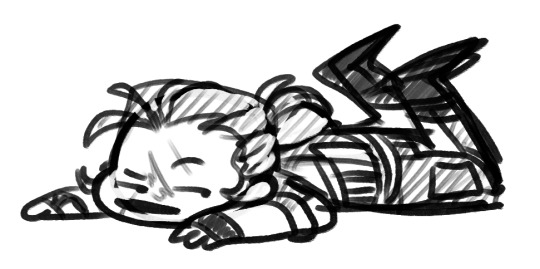
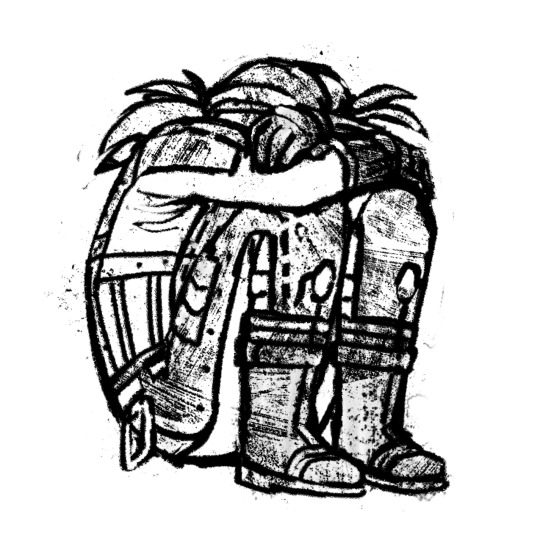
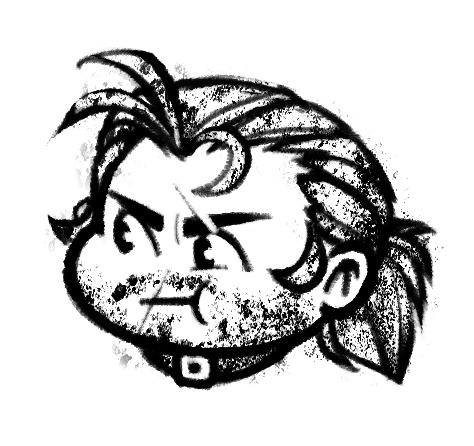
51 notes
·
View notes
Text
Hashtag: RelationshipGoals
fandom: Stony (Steve x Tony)
summary: Steve is being forced into getting a Twitter accounts and logs into Tony’s for inspiration - one mistake later, he finds more than he asked for. Meaning, his boyfriend has a tickle kink and Steve has a lot of thinking to do.
length: 5 468
a/n: Happy Friday 13th! *throws confetti* To celebrate I am posting a fic that contains one of the biggest fears for people with tickle kink - someone finding out when you are not ready to tell them. It has a happy ending, promise! Hope you all will enjoy this fic, feedback, reblogs and likes are appreciated and needed! fic inspired by this prompt.
—————
Hashtag: RelationshipGoals
Long story short - Steve was getting a Twitter account.
Long story long...
It all started with a certain PR meeting held for the Avengers team, just this time, it was Steve vs the whole PR team. The problem was simple - Steve didn't like social media and didn't have an account on any of the numerous websites and apps. Fighting with aliens, planning new missions, schooling SHIELD agents - those were the zones he felt comfortable in. Some thought that the hidden reason behind the hostility towards social media was, that Steve, born in the 1920s, had a problem with using modern technology. Some called it endearing, some pathetic, the truth was, that Steve fairly quickly mastered each piece of technology he was given, skillfully using any given device. After all, he wasn't dense. Many apps were quite useful, some just plain entertaining, and it required a lot of navigating, but he managed to find some favorites. Just when it came to social media… Steve didn't feel like sharing his private life with unknown faces. Call him old-fashioned, but he liked having direct contact with people and as much as he liked to take a stop during his random walks in the city to talk with people who called themselves his fans, it quickly became too overwhelming. He wasn't good at such things and always thought he was too awkward and not what people expected. Steve didn't like that kind of pressure and didn't like the almost weekly notices from the PR team that he needed to make himself more 'accessible'. By no means, he was expected to stop and talk to everyone who ever called him or share mission details with strangers, but he needed to create a more public persona for Captain America and Steve Rogers.
Hence, Steve was encouraged to take a plunge into the world of social media.
And he really, really, really didn't want to do that.
One - it was pretty tedious to keep up with everything. Tony eagerly showed him all social accounts he had - Twitter, Instagram, Facebook profile, Youtube, and it all just gave him a headache as Tony chattered which media was good for what and gladly showed him his own Instagram page (mostly workshop photos and meals Steve had prepared for him, which was kinda sweet) and if Steve became slightly interested in that, his interest dropped after hearing about filters and tags. Too much work.
Second - he didn't have time to keep his theoretical accounts active and post new content regularly. Or more, he didn't want to make time, preferring to spend it on reading or training or hanging out with Tony or anything else, really. He had been gently suggested, that some celebrities (Steve's eyes widened a little after hearing that - was he a celebrity?) hire someone else to run their social media accounts. Steve shook his head at the proposition, knowing that none of his teammates did that and so he shouldn't either, not mentioning that everything posted wouldn't be sincere.
Third - Steve considered himself not an interesting person. He didn't have Tony's charisma, who, of course, had the biggest social media following ever, Thor's flair, which made his Youtube channel where he tasted food sent to him from all over the world by his viewers a huge success or Clint's humor, whose Internet activity limited to commenting on funny animal photos and home videos and people loved him. Even Bruce, seemingly even more awkward and distant when it came to dealing with a privacy-invading crowd, was doing great, kindling the interest of young kids in science with a series of easy to repeat experiments at home and railing about the importance of protecting and preserving the environment. Even Natasha didn't have a problem, her social media accounts full of useful self-defense tips for everyone who needed to feel safer. Steve just couldn't find anything in himself he would like to share with the world. He liked to keep his art private, his relationship private, and his whole life private.
It should be the ending statement.
It wasn't.
And so Steve, feeling scolded, got back to his and Tony's shared floor, planning to hide, except that he was assigned a very simple task for the week.
Get a Twitter account.
Steve sat heavily on the couch, putting elbows on his knees and palms around his cheeks, definitely not pouting. Why on Earth did he need a Twitter account? Wasn't it enough that from time to time he appeared on Tony's account, being the supportive boyfriend, and allowing Tony share the photos of their date nights or even the short movies from Steve's training when Tony was proudly showing off Steve's impressive physique and using those damn filters and making small stars and glitter swirl around him.
Speaking of Tony, he could use his boyfriend's advice... Steve checked his phone and knew that Tony was still stuck in a business meeting, and won't be back for an hour or so and as much as he wanted to not think about the Twitter issue it kept coming back to him. What was he supposed to write on Twitter? Something that wouldn't give too much about him, but would be safe and entertaining. He needed inspiration. Maybe a walk would clear his mind but as Steve was getting up, he noticed Tony's tablet laying at the edge of the coffee table.
Well... Tony wouldn't mind if he took a peak, right? Granted, he never used Tony's tablet before without his boyfriend’s permission. It felt too personal and barging on privacy and it was almost a silent agreement between them that Steve won't touch Tony's electronic devices and Tony won't look through Steve's sketchbooks without prior agreement. But it was different, right? Tony's Twitter account was out there, for everyone, so it didn't matter if Steve would install the app on his phone and check the account, or go to the source and look through Tony's account. It might even help him to understand better how the app was working.
Steve took the tablet and unlocked it, searching for the Twitter app. Letter T on a blue background. Steve pressed it and skimmed over the screen, looking at the design of the app. Huh, it looked very different from the account owner's point of view. He scrolled down the screen, seeing a lot of text, too much text because wasn't there a limit of signs per tweet? Further, into the app, Steve saw more of things he didn't recognize, didn't see any posts from other Avengers, instead of images and gifs and -
"Woah," Steve gaped, taking in what he was seeing. He quickly scrolled up, his face becoming heated, unsure what he just saw. For a minute, he turned the tablet in his hands, trying to decide if it really belonged to Tony and not someone else, but who else would have a hot red and gold cover, resembling the design of the Iron Man suit. It had to be Tony's tablet, which meant...
Those posts were Tony's. That account was Tony's. Tony had two Twitter accounts? Steve looked back, just now noticing that it wasn't Twitter after all. At the top of the screen on a background of dark blue in white letters was written Tumblr. Steve didn't hear of the app, it wasn't listed as one of the most popular ones for celebrities and that's probably why Tony used it for -
Steve wasn't exactly sure for what. For something secretive. Something he wanted to hide. Things he didn't admit even to Steve.
Cautiously, Steve scrolled down again, trying to keep an open mind and be more cautious. He wasn't a prude, he knew that people had different kinks and it was completely normal. Heck, he and Tony had a very healthy sex and intimate life and the sight of Tony tied down for their playtime always made Steve's blood boil with lust and desire and they did indulge in some kinks, Steve current favorite one included spanking Tony's bouncy ass and watch it jiggle and the skin turn red. Tony had no problems with sharing his kinky fantasies and Steve was always willing to give it a go, sometimes proposing things on his own, like wax play, which wasn't only sexy but also artistic - Tony's body colored with drips of different colored wax was a beautiful sight. This... This was something different, Steve didn't think to consider.
There were pictures, that without context seemed innocent, like an array of feathers on a pillow. Some were less subtle and showed a part of sucked in stomach, escaping from a coming closer feather duster. The gifs were the most intriguing - a tied up, blindfolded man, laughing and squirming, while a different man was...
Tickling him?
Steve's brow furrowed as he watched the gif, frame by frame. There was no doubt that it was tickling, fingers gliding over tied man's armpits and sides. Steve expected this to be a prelude, something more to follow, but it was all. Tickling was the main point. Steve blushed when he realized that if there were gifs, there had to be a video and who knew how long it was. How many minutes would it take to bring someone to the brink of hysterics, to make them crumble, but at the same time make it pleasurable? People were not forced into filming porn and following that principle, there were not forced into filming tickle kink videos.
And that being said...
"Huh..." Steve mused out, bits of information falling into one picture. They never discussed it, but in the back of his head, Steve had this thought that Tony enjoyed being tickled, or at least didn't mind terribly. The way he squirmed between Steve's tickling hands but didn't try to run away. How he laughed and screamed for mercy whenever Steve targeted a sensitive spot and always seemed a bit disappointed when the tickling ended but masked it with a smile and complaints of being assaulted. Sometimes, Steve just felt provoked into tickling his boyfriend, like that one time, Tony had taken his sketchbook and hid away, refusing to say where he hid it and Steve had to tickle the information out of him until Tony was absolutely incoherent from laughter and breathless.
That was cute. All those shared tickle moments were cute, but Steve never thought that they could be... hot. And intimate. He looked back at the gif, at the way the tickled man arched and bucked, but was not able to escape the ticklish strokes delivered over his skin. What if Tony was the one tied and spread in the chair and Steve was the one standing behind, dotting his fingertips over the bare torso, having that sense of power and control, enjoying the ticklish tremble of the bothered skin. It became a tempting image in his head.
'Guuuuys, I don't know what to do.'
Steve's eyes caught on some text among the images and gifs. A separate post.
'I still can't tell my bf that I like being tickled. I just can't! There is this block in my head -'
Steve read the text, feeling that he might know the author.
'I even did that thing you recommended with hiding his stuff away -'
Definitely knew the author. At the top of the post, he saw a name, probably the username and clicked on it. Blue background color, and image of feathers and the username in white bold font. The Spare Parts Man.
That was one major hint...
Steve scrolled down this page, seeing more text and images of people being tickled, some like, a gif that was of a zoomed in stomach, the belly button tickled by a tip of the feather, signed with a 'omg, goals', whatever that meant. Steve tried to search for the text he saw on the previous page, but couldn't find it anymore, instead saw more posts, where people seemed to be interacting with the author.
'Hi, SP! I was the one who sent you the asks with hiding your BF's stuff -'
'I am sure your BF will understand, from what you said, you are dating for a long time -'
'You still didn't tell him??? What are you waiting for, GO GO GO!'
Steve pursed his lips together, feeling upset that Tony was so willing to share with strangers, but not with him. This whole site seemed so secretive, and while Steve felt a bit betrayed, he started to think about things from Tony's perspective. Tickling wasn't a mainstream kink. Bondage, spanking, food play - all the things they had tried seemed to be more acceptable in the sex world while tickling... Some people enjoyed it, some hated it. Steve was somewhere in between. It could be a fun thing among loved ones, but could quickly become overwhelming and unbearable. Steve didn't think about it earlier, but he really liked tickling Tony. He loved the way his body twitched, the sound of his laughter, and the feeling of closeness and trust in the action. For Steve it was fun. For Tony, it had to run much deeper, forming stronger connections than it did for Steve.
'I don't want to lose him. What if he thinks I am a freak?'
No, Steve would never think that. Tony was the great love of his life and Steve accepted him on every level.
"Oh, babe..." Steve sighed softly, reading more posts, some screaming nervousness as Tony was pouring his heart out, feeling miserable with his inability to tell Steve the truth, some so heartwarming and oozing happiness when Tony was describing Steve's last tickle attacks and how incredibly good and completed it made Tony feel.
That. Steve wanted to make Tony feel like that every day. Satiated and fulfilled and safe.
No more secrets.
Carried on the moment, Steve pressed on an icon with a pencil and began to write.
***
Tony was bored. So, so bored. He caught a glimpse of Pepper sending him a scolding look and straightened up in his seat, pretending to pay attention. He just wanted to go back home and curl up next to Steve, feeling Steve's fingers stroking his hair and maybe, if he got lucky, Steve would rub his belly, using just enough pressure to make him smile and feel like melting. He started to smile at the thought and Pepper sent him a confused look. Uh oh. He better control himself. Tony grinned sheepishly at Pepper and set his face in a schooled, thoughtful look, trying to focus his attention on the meeting. Just half an hour more... It was all ending statements, so it was nothing bad if he decided to check his social media, right? Cautiously, Tony took out his phone and unlocked the screen, keeping the phone under the table. A new tasting video from Thor, with a package of sweets sent from the Netherlands. Tony made a mental note to drop later to Thor's floor and ask if he had any stroopwafels left to share because they were amazing with black coffee. Clint commenting on funny cats videos, Tony added it to his watch later list. As usual, his own social media were bursting with notifications, people raving over Iron Man and asking for more videos of Steve training routine, which, Tony couldn't blame them, the sight of his boyfriend working out was heaven. He even decided to check his Tumblr, curious if anyone sent him some more tips or maybe just left him a nice message -
Oh, that was weird. Usually, he had maybe two or three messages, some reblogs, and a few comments. This time, his app was bursting with notifications and Tony didn't post anything that could cause such a commotion in the last days.
'WHAT. WHAT????"
'Nooooooo... Please don't break up with him! He loves you so much!'
"The hell, dude! You invaded your bf's privacy like that?? You're the worst!"
Tony didn't understand anything. Maybe he clicked and shared something by accident. There was a slight possibility that his account was hacked. Maybe -
Maybe it was way, way worse.
There was a new text post on his main, one he didn't write.
'Hi, this is Spare Part Man's boyfriend. I found this account by accident and me and my boyfriend have a lot to talk about once I see him.'
No. No, no, no.
"Tony? Tony, are you okay?!"
Tony didn't realize he started to hyperventilate until Pepper's voice brought him back. Everyone was staring at him and Tony felt like vomiting.
"I am fine," Tony said, not meaning it, his voice coming out squeaky. "Can we - excuse me, I have to go," Tony rambled out, sending a sorry look in Pepper's direction and trying to walk out of the conference room as calmly as possible. It felt like the whole world was spinning around him, making him feel nauseous. Tony stumbled to the window and pressed his face against the cool glass, trying to soothe his heated skin and get his thoughts back in order.
It wasn't supposed to happen. Not like this. Maybe it was never supposed to happen, staying as his hidden fantasy and dark secret. What if he deleted the account, right here, right now, would he be able to convince Steve that it never existed?
No. Steve wouldn't fall for it. And Tony felt so stupid for creating that account in the first place, but he needed a place to vent. He didn't plan on socializing, sharing his life, just get the urges out and move on. He just... Wanted to feel accepted. Find people who thought the same as he did. Not feel so alone.
And he would end alone because Steve definitely was going to dump him.
***
"I am back!"
Tony was a genius. He had numerous diplomas to prove it. Yet, he decided that the best thing to do would be to march into his and Steve's shared floor, acting like nothing ever happened. Maybe if he managed to keep his cool he could put this whole Tumblr thing as a social study. Just a research on kinks. No biggie. He could do this.
"Tony, come to the bedroom for a second!"
Somehow hearing Steve's voice made this situation very real and not like Tony imagined it. He couldn't say anything from the tone of Steve's voice, it was neutral, not angry, but also wasn't the cheerful, loving one Steve had towards him. On usual days, Steve would come to him, resembling an excited puppy and lick his face - kiss, Tony meant kiss, and then they would sit on the couch and share their day. Their bedroom was a private, closed space and once Tony set his foot there, there was no way back.
Feeling a nervous twist in his stomach, Tony peeked into the bedroom, just to feel if the situation was as bad as he feared. Steve was on the bed, forehead creased in thought, and was looking at the space in front of him until he spotted Tony from the corner of his eyes.
"Tony - " Steve started, sitting up straight, pulling shoulders back.
"No, Steve, I - " Tony walked into the bedroom, trying to make his voice strong. Just remember what he had planned and it would be fine. "I want to talk first, okay?"
Steve blinked and frowned lightly, but kept his lips tight. Alright, if Tony insisted.
"Okay," Tony nodded, trying to give himself some courage and began to pace around the room. "I know you found my Tumblr account," he said the obvious, struggling to keep his voice firm. "And - and it was not true, you know that, right? I just - research - an experiment to - ahh," Tony quickly got lost in his words, noticing Steve's look changing to a confused one. "I - ah, fuck, fuck, fuck - " Tony couldn't get any coherent words out and stopped and hid his face in hands. He continued to quietly curse, not knowing how to get out of this mess and not lose everything.
"Babe..."
Tony almost jumped away, when Steve came closer and wrapped arms around him. After a moment of hesitation, Tony buried himself into his soldier's arms, his face pressed against Steve's neck. Probably the last hug he would receive from Steve. This whole thing won't make Avengers stuff awkward at all. What if Steve would quit the team? Tony couldn't imagine not being able to see Steve anymore. He needed him. He would change, he would do better. Steve couldn't break up with him.
"Of course that I am not breaking up with you," Steve said suddenly, and Tony winced, not realizing he said it out loud. "Is that what you thought?" Steve asked, sounding shocked. Reluctantly, Tony nodded. Somehow he was used to being rejected and walking away from problems was one of the things he did and expected the same happen to him.
"God, Tony," Steve said in an exasperated huff, not believing how quickly this whole thing could escalate in Tony's mind. Then again, he should know, because Tony did think too much and sometimes didn't stop his thoughts on time, letting them drag him deeper and deeper. "Tony, I am not breaking up with you," Steve said again, just to make sure the words sunk in his boyfriend's head. "And I am sorry," Steve gently put his thumb and forefinger under Tony's chin, encouraging him to eye contact. 'Sorry you turned out to be messed up in the head,' Tony finished in his mind, looking into Steve's blue eyes.
"I am sorry for barging into your space when you didn't feel ready to share yet," Steve said, closing the distance between them and leaning his forehead against Tony's.
What?
Tony didn't reply, just stared, his brown eyes widening. Steve was... apologizing to him? Not the other way around?
"I read some of your blog," Steve said and Tony panicked again, Steve holding him closer when he felt brunet's body tense, "and I understand how hard it is for you to talk about it and how important it is for you. I really do. If anything, I am... a bit disappointed you didn't tell me. Why didn't you?"
Tony's mouth twisted into a scowl. He was disappointed with himself too, but it was hard. Harder than admitting that he liked being pinned down by Steve, or spanked, as it all seemed... simpler. It was obvious why people who enjoyed it were turned on by it. Tickling wasn't easy to explain.
"I wanted to," Tony finally spoke, his voice coming out quiet, "I didn't know how," this wasn't a good answer. Tony closed his eyes, not able to look at Steve. "I was embarrassed, I guess."
"Hmmm," Steve hummed in understanding, waiting for Tony to continue, but he didn't say anything more. Tony had no problems with voicing out his needs on his site, but face to face with Steve, he was fumbling and struggling for words. Anonymity gave him a sense of control which was being stripped away from him, layer by layer. Maybe with time, Tony would open more, and it was on Steve's side to nurture that vulnerable mindset until Tony would feel strong enough and confident to voice out his true needs.
"Then... can you tell me why you like it?" Steve tried, sounding gentle and not judgmental. Keeping an open mind was the key here.
"I don't know," Tony said quickly, sounding defensive. He didn't mean to, but it was stranger than him. He didn't want Steve to judge him, to think less of him, but... It was Steve. Steve who was always so understanding and didn't laugh at him and did his best to keep Tony feel accepted. It won't work if Steve would be the only one willing to share. "I guess," Tony corrected himself, trying to be more open, "I like the trust in it. And closeness," he said, tugging on Steve's clothes and hiding more into his boyfriend, "and, uh, it feels good."
"Feels good?"
"Yeah," Tony admitted, burying his heated face deeper into Steve's neck. "Feels really good. Especially when you are the one ti - doing it."
"Oh," Steve said, carding his fingers through the short hair on the back of Tony's head. Tony shivered, just slightly, from the light touch, smiling against Steve's skin and Steve felt an urge to touch him all over. This time differently, more aware and more intimate, paying closer attention to the reactions. "So... you wanna do it?"
"Do what?"
"You know what."
Tony moved away from Steve, showing a confused face. That kinda felt like mocking him, but Steve's face was honest. And it would certainly change the mood and make Tony feel better about this whole day. "I don't know," Tony said, just to be safe, "do you want to do it?"
"Heck yeah."
"What? You do?" Tony asked, his mouth falling agape at the enthusiasm.
"Sure. You like it and I like tickling you too. It's a win-win, right?"
Tony started to smile in relief. It was really happening. Steve accepted one of Tony's darkest secrets and even wanted to take part in it. Tony could barely wrap his mind around it, already feeling excited and giddy.
"So?" Steve asked again, eyes sparkling, waiting for permission from his boyfriend.
"If you keep asking, it takes the surprise factor AWAAHHAHA!" Tony's newly found boost of confidence was efficiently cut off when Steve latched hands to his sides and squeezed repeatedly. Tony doubled over in laughter and squirmed away, watching with a pounding heart as Steve followed him, smiling beautifully mischievous. "No, no, no, wait, Steve! STEHEVE!" Tony screeched in laughter when Steve ran forward, pushing Tony on the bed, and falling with him. "ACK! STE - hahaha! Waaait!" Tony wailed when fingers were going up and down his body tickling intensely. When Tony became pink in the face and a little breathless, Steve stopped, leaning in and kissing Tony's smiling lips.
"I love you, babe," Steve whispered, looking at his lover.
"I love you too," Tony answered, his heart hammering from the ticklish rush and all love he had for Steve.
"Are we good?"
"We are good," Tony assured, still not believing that everything turned out so great.
"Good," Steve smiled, and just now Tony realized that somehow both of his wrists were in soldier's hold and Steve easily pinned his hands above his head, leaving his torso exposed. "Because now," Steve said, sitting on Tony's thighs and slowly sliding his free hand under Tony's shirt. "I want to test every ticklish spot on you."
"Oh fuhahahck - " Tony wriggled uselessly, his stomach sinking in when Steve gently ran fingertips over the soft skin. "Steve, Steve, pleaheehehehese!"
"This is just your tummy and you already are so ticklish. It is a very promising start."
"Ahhahaha!"
"Oh, is this rib ticklish? How about this one? And this one?"
"GAAA HAHAHA!"
"Oh look, the higher I go, the more you laugh. Sooo, this means that when I do this -"
"PFF HAHAHAHA!"
"That's one ticklish armpit you have, babe! Let's find out if the other one is as ticklish -"
Steve was grinning, watching Tony crumbling and laughing, coming apart under his fingers. Steve was right, it was a win-win for both of them.
***
"You should write on your Tumblr."
"Huh?"
"You should," Steve repeated, rolling on completely naked Tony and kissing his lips, "write on your," a kiss on the chin, "Tumblr," Steve finished, blowing a raspberry into Tony's neck.
"HAAHAHA! Stoooop," Tony tried to swat Steve away, feeling too blissful to move. Of course that a long, intimate tickle session changed into an amazing make out. It was incredible how the tickle foreplay increased their appetite and how wonderfully responsive Tony became.
Steve laughed and rolled on his side, looking at Tony with adoration. Laughing made Tony ten times more attractive in Steve's eyes, and Tony was off the scale to start with.
"I am serious, babe," Steve tried again, gently poking his finger all over Tony's bare belly, making him squeak funnily and curl up, "write on your Tumblr. Everyone has to be worried."
"Ah hahaha... Ohkahay!" Tony agreed, shielding his stomach with one hand and using the other one to reach for his phone. "Uhh... Should I update and delete it?" Tony asked. With everything working out so great, there was no reason for him to keep that account. No more secret lusting, when he had it all in real life.
"If you want to," Steve said truthfully, "or maybe you can keep it for a bit longer because I might need some inspiration on how to take you apart."
"Ahhh, not sure if I want to give you access to that sort of power," Tony teased, opening the app. "Huh, people kinda hate you."
Steve shrugged, understanding that what he wrote, did sound menacing, even if it wasn't his intention. "Just write that we are fine and your boyfriend plans on fulfilling your each and every one tickle fantasy."
"You do?" Tony asked, voice trembling with excitement.
"All of them, babe," Steve assured, smiling broadly. He had remembered some of the things he read and gifs he saw, and could easily imagine Tony on the receiving end.
Looking enthusiastic, Tony got to writing. Soon, Steve got up and leaned over Tony's shoulder, looking at the screen.
'Hi, guys. Sorry for the sudden silence but as you saw we had a situation here. It is all good now, me and BF talked, and he turned to be all sweet about it, not bragging, I just had my first tickle session and it was amazing! So, I just wanted to give you an update, that I am fine. More than fine. My BF said that I can keep this Tumblr if I want to and he will even use it as an inspiration, so aaaah, can't wait. Just don't give him any ideas! I am gonna talk to you all soon, but for now, I and my BF have plans. See you later!'
After the post got published, Tony and Steve didn't have to wait for a reaction.
'AAAAH! I AM SO GLAD EVERYTHING IS FINE! YOU BOYS HAVE FUN NOW!'
'Awesome, couple goals.'
'That's great, dude, but I hope your BF apologized.'
"That's the one that doesn't like me, right?" Steve squinted his eyes, pointing at the last comment. Tony laughed and nosed Steve's cheek playfully.
"It is okay, I like you," he smiled. "Do you want to have a nickname? That will make it much easier for me to write when you are involved."
"Um, sure," Steve said, not entirely sold on the idea, but not wanting to shot Tony's idea down. "You call yourself Spare Parts Man, right?" Steve asked and Tony nodded. "Soooo... How about you call me Iron Man?"
Tony's smile dropped in surprise, and he laughed mockingly. "Seriously, dude?"
"Hey, the darkest place is under the candle," Steve said, sounding defensive.
"Fine," Tony agreed, rolling his eyes dramatically. He reblogged the post and added an update.
'BF wants you to call him Iron Man. I know, lame.'
"Ack!" Tony almost dropped his phone when Steve scoldingly pinched his side. Soon the first comments came.
'Ah you sound like a superhero couple, how cute!'
'I am shipping you both. #relationshipgoals'
'Wow, your BF is not very creative, isn't he? But fine, let it be IRON MAN.'
"Write to this one that I don't like them either," Steve hissed, looking at the last comment.
Tony laughed and turned to Steve, pressing their lips together in a kiss. Long and sweet. The kind of kiss that was the perfect happy ending to a tickle kink coming out story.
"Oh, interesting!" Steve suddenly said, ending the kiss too soon and looking at one of the comments, smiling wickedly.
"What is int - noooooo!" Tony wailed, understanding the reason behind the smile. It was stronger than him and Tony started to panic. "It is a lie, Steve! Don't believe the lieeee no no aaah HELP!"
Steve laughed, wrestling Tony down and pinning his hands once again. If Tony was already getting this worked up, there was no way Steve would back up.
"No, please!" Tony giggled, kicking his legs, trying to wriggle away, as Steve's menacingly moving fingers were getting closer and closer. "I cahahahan't!"
Somehow, Steve didn't believe him. Instead, he believed the comment.
'Hey, this is for Iron Man - I am sure you know already, that SP's stomach is really ticklish, but did you try tickling his belly button specifically? From what SP writes it is a very ticklish outie. Have fun!'
When Steve pressed his finger over Tony's outie delicately and Tony burst into giggling, almost maniacal laughter, Steve was in heaven. It was settled, Tony was keeping his blog for further tips for Steve.
#stony#steve rogers#tony stark#superhusbands#stevetony#tickling#tickle kink#tickle fic#upperbody tickling#fanfic#fanfiction
71 notes
·
View notes
Text
If Dr. Frankenstein was a Woman
What had she done? After all these years, learning from her husband. Performing her own experiments on the dead brought in by the huntsman, she paid him well to bring in the most intact bodies. Human or beast. Her work has lead her this far. Working in secret for a woman could never be a doctor. Not in this world.
But, through it all, she had created this. With the huntsman's help and her reluctant husband, body parts from the graveyard were collected. Only the finest pieces would. The freshly dead from illness or injuries, their unneeded organs and limbs were collected so she may continue her work. But her husband, even after the body was patched together, he told her it would never work. That what she was doing was against God's will. She ignored him.
With the brain and heart finally in place, she could begin. The eels were fed, the storm raged on outside. And she could begin. The rain poured, lightning struck. It was perfect. The body was on the grid, over the bodily fluids that took her almost a month to collect. It had to be enough. She kept it boiled in order to get a reaction out of it. The eels were angered and threatened. They would soon be dumped in when the timing was right. The body, no matter how hideous it was, was beautiful.
"Don't do this."
Victoria turned to her pathetic husband. She was stern as she glared at him, "I will continue. You cannot stop me."
This has to be done. She has spent her youth studying and dedicating herself to science. She would not let this man get in her way. He who dared called himself a man of science thought what she was doing was too reckless, that there would be consequences. Perhaps there will be, but that did not matter. Victoria von Frankenstein worked her youth away for this moment.
Elijah was rightfully upset about this. At first, in the beginning of their marriage, he was excited to have married a woman so interested in his work. But as the years went by, his wife became far more invested than even he was. His work soon became her work. His experiments, hers. She took over his laboratory, his utensils, his books, their bed. It was all hers. By this point he was afraid of her. Her and her madness. Their friends have long figured her barren for they had no children. But truth be told he was too afraid of her to even try.
"Be ready to lower the body."
The huntsman, Thomas, was much more eager to see this through than Elijah. He always had a fascination with the dead. His first prey was a duck in his family's pond. His most recent was a thief with a limp in his step. Victoria gave him a reason to kill, Elijah gave him someone to fear him. Both men took their positions, using hand cranks to lower the massive body into the tub below. Elijah then knew to raise the lightning rods. Thomas took Victoria's side as she poured over her notes one last time.
"Any second now! Release the eels!"
Thomas was quick to dump the slimy bastards into the tub. They swarmed over the body angrily. A few jabs into the tub with a wooden stick and they were alive. Victoria could feel her arm hairs stand up as the eels lit the body with electricity. The lightning was a precaution. Just in case the eels weren't enough. But they were! The body shook, twitched, and then moved!
Victoria, in a moment of ecstacy, screamed out in triumph, "Its alive! Alive!"
And it was. No, he was. Those strong arms grabbed at the tub's sides and he desperately pulled himself to sit. Life's first breaths. Victoria ran over, tears in her eyes. His mismatched eyes looked around the room, panicked and afraid. His great stomach heaved. She smiled broadly as Elijah cowered and Thomas backed up. Yes! She had done it! He was perfect for only the most perfect pieces went into making him.
"Look at you, look at him!"
The boy stumbled out of the tub, awkward with his massive size and limited knowledge on how to function. But she will show him with time.
Victoria took a towel, the biggest she could find, and wraps the boy up. He calms as she drys him off, whispering to him sweetly. Thomas approaches the pair in awe.
"You've done it… you actually have done it!"
Victoria smiles, "I have! Look at him! He breathes, he walks!"
She takes the boys large hands and squeezes them, "My son…"
Elijah almost choked on the very words she spoke, "Son!?"
She turned to him and glared, she reminded Thomas of a mother bear, ready to launch herself into danger to protect her cubs.
"We made him, did we not?"
Elijah shakes at the truth. He did help make this… monster. Monster, that was the only word that would describe him, no, it. Monster. But Victoria smiled maddeningly as she lead the thing out of the room, coaching him on how to step and where to go. Elijah shook his head, no. This wasn't happening. But Thomas walked past with a grin that shook him even more.
"How's it feel to be a father?"
Thomas wasn't shocked by this whole experience. Unlike poor Elijah.
#frankenstein#mary shelly's frankenstein#female dr frankenstein#if frankenstein was a woman#frankenstein's creation#frankenstein's creature#frankenstein's monster#short story#story#original writing#fic#monster
16 notes
·
View notes
Text
The Dead of Night
Title: The Dead of Night
Word Count: 1,346
Pairings: Intrulogical, platonic DLAMP, (Platonic Prinxiety or Rociet if you look hard enough)
Warnings: blood, kind of gore, ghosts, ouija board, cemetery, Halloween
Summary: Logan didn’t believe in the supernatural the way his friends did, but with their luck, he should have known to expect even his precious science to betray him.
Logan knew better than to mess around with a Ouija board, or at least he should have.
He didn’t particularly believe in ghosts—he was a man of science, after all—but with his friends, the uncanny was to be expected.
“Come on, Lo, not scared, are you?” Roman teased, tossing the football that was part of his costume his way and chuckling when Logan fumbled it.
“Hardly,” he countered, tossing the ball back but misjudging it so it instead bounced off Roman’s knees. “I just think there are better things to do on Halloween.”
“Like give out candy to sugar-rushed fiends? Re-watch pathetic ‘horror’ movies while Patton complains about a stomach ache because he had too much chocolate? Where’s the thrill in that, the adventure?”
Roman grinned at his friend, clasping D’s shoulder while saying, “At last, someone is speaking my language.”
“And Logan, what of a new discovery? The damn scientific method?”
“Ghosts aren’t real,” Logan replied stubbornly, glancing to Virgil—the second most logical in the group—for support.
“Don’t know,” he shrugged, “could be fun.”
Surprisingly, Patton was the one to interject, “Maybe . . . maybe we shouldn’t. This is the one night a year the ghosts have off because everyone is too busy doing other things to summon them. They might get angry.”
“We’ll be quick,” Roman affirmed, offering both Patton and Virgil—dressed as Peter Pan and the headless horseman respectively—a hand to pull them to their feet. Then he took the lead, opening the front door with Dee following close behind. “Come on now, Geek Squad.”
What we’ll be is dead, he thought, shaking his head before pulling up the rear, picking up the Ouija board that the others had almost forgotten and closing the door behind him.
The cemetery wasn’t far, just down the street, so they went on foot. The sidewalks were packed with kids cloaked in fabrics of every shade from ghost-white to pure midnight black. Princesses, pirates, heroes, villains, and monsters ruled the night, running from house to house as their parents tiredly followed at a distance. They paid the teenagers no mind and likewise, Logan and his friends ignored them.
But he remained cautious, apprehensive because, really, there was no scientific explanation for why his skin crawled. They were surrounded by people and the lights of their flashlights led the way, remaining on even as they slipped into the woods—leaves crunching beneath their sneakers—and towards the front gates of the cemetery.
The erected tombstones were silent thrones, marking corpses that have been decomposing for centuries and blocking out the hush of the wind as they all sat on the cold, hard ground.
“Did you remember the board, Roman?”
“I have it,” Logan said, placing it in the middle of the circle the others had created before taking a step back.
“Too scared to join, Lo?”
“There’s only enough room for a few of us and I am the least inclined to participate . . . so unless you are too scared and want me to join in, I’ll sacrifice my spot for you,” he countered, the banter almost too easy between him and his best friend. Roman scrunched his nose in response before turning back to the board, fingers brushing against his friends’ as he placed two of his on the eye.
Patton hesitated, eyes flickering back to Logan with his arms crossed and back leaning against a tombstone so old that the name was no longer distinguishable. He looked genuinely frightened.
“Don’t worry,” Logan assured in a quiet voice so that the others wouldn’t be able to hear, “there’s nothing to fear because it isn’t real. There’s no place after our world and, frankly, I don’t believe in the existence of souls because there is no proof and therefore, no way for the living to return as a ghost or anything of that nature.”
But Roman, Virgil, and Dee had already begun, Patton now unable to join as they moved their hands around clockwise and recited a phrase in hushed voices that Logan could barely hear. They were hesitant despite their earlier excitement. Something was amiss.
“Is there anyone here?” Dee called, voice rising to a normal tone. “If so, speak to us.”
Silence, not even the wind dared to breathe.
He repeated, “Is there anyone-”
At once, the flashlights from their phones went out, all dying as a cloud raced to conceal the moon, plunging them into an impregnable darkness.
Roman and Patton screamed, Virgil bit the inside of his cheek, and Dee’s breath hitched. Logan glanced down at his phone, brows furrowing as he tried to turn it back on, but not even the red bar flickered onto the dark screen. Not dead, tampered with, then.
Dee tried again, “Is there any-”
“YES, NOW SHUT UP!”
The five boys turned towards the disembodied voice, paling as a translucent figure floated inches above the ground with something that looked like blood dripping down from both its eyes and its mouth.
Logan tried to speak but found himself unable to, payalyzed as Virgil—in a moment of fight or flight—grabbed Roman by the wrist and took off, Patton on their heels.
Finding his voice but not looking away, he said to Dee, “How did you-”
“I didn’t.”
He was silent for a moment, feeling his heart race and beg him to follow it out of the cemetery. “Oh.”
The ghost—a boy that must’ve been about their age—grinned wider at the exchange, eyes almost horrifically wide and drawing attention away from the stitches adorning his neck and cheeks. He moved closer and Dee abandoned the board, Logan, and the ghost without a second thought. But even in his cowardly flight, he seemed to glide with purpose more than run for his life like the others had.
Logan stayed, unable to look away.
“Why don’t you run?”
Without missing a beat, and speaking without thinking much of it, he said, “Because there’s nothing to be afraid of.” And you’re somehow the most beautiful thing I’ve ever seen.
He left that last part out, not sure exactly where it had even come from. Hell, he wasn’t even sure what it was, maybe just the beauty of scientific discovery and realizing just how mysterious and incredible the world he lived in was. But when the ghost took a step forward (would they be considered steps? he was floating, after all—a question for Logan to ponder later), his chest constricted. He concluded that it wasn’t that, not at all.
“What’s your name?”
“Names have power,” the ghost countered, smirking as he moved closer still, until they were less than a foot away. “And I won’t tell you mine unless you tell me yours.”
“Logan,” he said, feeling that there was no need to lie about it.
“Logan, Logan, Logan . . . I knew a Logan in life.”
“I’m sure, we are far from a minority.”
“Funnier than the others, aren’t we?”
“Your name,” Logan insisted, watching as the other’s head turned all the way around his body, hands reaching up to grab his head and straighten it as if it had moved on its own accord.
“And you’re sure you want to know, Logan, one of many? Finding out means creating a bond and . . . well, I’d have no reason to ever leave your side.”
The corners of Logan’s mouth flickered upward, the first hint of emotion other than shock he had revealed the entire night. “Perfect, a man can’t run experiments on an absent test subject.”
“Remus,” he said, looking away after and Logan’s phone sprang to life. He glanced down for a second, the bright light surrounded by the dark apple logo catching his attention, and when he looked up, Remus was gone.
Logan’s flashlight had turned back on and was directed to the ouija board where the eye was moving on its own accord. He crouched down beside it, silently recording the letters as the ghost, Remus, communicated.
You should be scared, I could kill you.
“Please,” Logan snorted, picking up the board and the eye before carrying it out of the cemetery, “I’d like to see you try.”
-
Author’s Note
just a quick little thing i wrote in one sitting in order to get over writer’s block. i was just going to make it a headcanon but thought why not write a fic to get the juice’s flowing?
thanks for reading and happy halloween!
ronnie
#intrulogical#intrulogical fic#intrulogical fanfic#sanders sides fic#sanders sides fanfic#sanders sides#halloween fic#halloween fanfic#halloween#thomas sanders#logan sanders#remus sanders#roman sanders#virgil sanders#patton sanders#deceit sanders#roceit#prinxiety#ghost au
116 notes
·
View notes
Text
What has been running through my mind since last Thursday
I have had so many thoughts since TROS came out.
Before it’s release I was beyond excited, hyper about it! It’s finally here, the conclusion, the wonderful finish to 42 years of amazing movies, ones that might not have been perfect, but built up to a wonderful story arc that I lived and breathed as a child and then as a younger adult. Now, as a middle aged adult female, who grew up with Princess Leia, Luke and Han, with Lando and Chewie of course, as well as Darth Vadar, as the background of my childhood, and I had gained Obi-Wan, Anakin, Padme, Shmi, and Bail into my inner circle of love for characters when I was in my 20’s and early 30’s; I was so excited because I had also in my 40’s gained Ben Solo (he was always Ben to me), Rey and Finn, with Rose, keeping Chewie nearby and giving me glimpses into the world that had never been perfect, but resonated with me.
Ben resonated with me most of all because of how my childhood went. I was a difficult child and teen. I say all the time that had I been born 25 to 30 years later than I was, I’d have been medicated from age 6 on. I had medical issues with my ears, my hearing. I developed severe anxiety around school and social situations, when my natural state is actually to be very outgoing. I am introverted in regards to my energy needs, however I am not a quiet person at all. I am too loud, too emotional, too intense for most people, my family most of all. I was the kid who cried too easily and stomped up stairs and slammed bedroom doors because of what I was lacking.
I lacked validation for myself, for my real feelings. Everything I experienced was real and concrete for me. I was not given any tools that worked for me, so I delved into myself. Deep inside I lived in a world that was private and a fantasy. I love fantasy novels, I have read more science fiction/fantasy than anything else, and all of it is always more fantasy than science. I loved Doctor Who growing up, watched it religiously every Sunday afternoon. I really had no choice but to rely on it to help me through my crippling anxiety and fear for every Monday morning. I was an embarrassment to my family, my mother did not know what to do with me, so she did nothing to change my coping skills. I was a 6,7, 8, 9, and 10 year old who did not know how to do anything of basic skills in school, had no friends for more years than I like to remember. I was bullied, and survived because we did not have the technology that we have now. I stopped having so many bad effects of my anxiety by the end of 5th grade because of a wonderful teacher, who was patient and funny. He never made me feel like a freak, though I was.
In my mind, I was stupid, worthless, unmanageable, unlovable, a problem. A problem that could not be solved. I wanted to leave my world and live elsewhere where I could become anyone I wanted to be. The transition from elementary school to middle school gave me the freedom within to change some things. I became more outgoing and tried to erase who I was in the past. I did not do that well, but I also made lasting friendships for the first time. My best friend since age 12 is a testament to that.
At 15 I planned to end my life. I still don’t know what stopped me, though I did not even follow through with any part of my plan. I pulled through, found meaning in music, books, my friendships. I survived even though I should not have.
I share all of this because when I watched TFA the first time, I understood Ben Solo so deeply it scared me. I thought, I’ve been there, I’ve had those thoughts. I tried to fight back the same ways. I did think about ending my father’s life twice as an adult. Once at age 18 and once at age 27. He was a hurtful and abusive man. The damage done was intense. I could never feel comfortable around my friend’s fathers because of what I thought a father was supposed to be like. And at the same time I wanted my father’s love so much, I craved it. Even through all of the psychological abuse, through the conditioning that I was put through, to be the perfect daughter. “Don’t be so loud, be thinner, don’t grow your hair long, be what I want you to be, be less emotional, be more helpful, don’t be selfish, don’t ask for anything you want, be satisfied with what we deem is right for you.” These words were the pinnacle, and they happened 2 months before he died (not at my hands, cancer got him in the end): “When you are thin, then you will be beautiful, and then you’ll find a husband.” I was 27 years old, single, the last one in the family, but not the youngest, the middle. I was pathetic to my family. Unlovable completely because my own father could not see my beauty or think I was worthy of love. I wanted to kill him by driving him off the road and into a tree, off a bridge, something. But I kept my mouth shut because that is what I was trained to do, and I swallowed it down.
When I was really young, before age 2, my father was attentive and loving. I was the perfect little girl. My younger sister was born right before my 2nd birthday, and I was forgotten. All of a sudden it shifted. I have visceral feelings of being pushed aside, and warned to be careful with her, not to hurt her. I was not a hurtful person, I was not violent. I could have only been violent to myself. I spent so many years hating her because she took my place because my father could not find it in himself to have space for both of us.
My mother was not much better, she was dismissive in her abuse. Forgetful and selfish in her own ways. They did not plan to have the 3 of us younger kids. We were all surprises! Yay! Wow, so now you are saddled with 3 more children you never planned for, and you actually have to parent them. What a concept! My mother was flawed in so many ways. She had the nerve to ask me if I needed her at my college and then graduate school graduations. Asked me if I needed her to see my first apartment. To all of you mother’s out there, aren’t you supposed to want to be present for those things? Wow. Though, with fucking bells on for my younger sister’s graduations! There are so many bad stories about how I was the throw away child in the family. It’s sick.
Ben was supposed to get better than he did! He was supposed to get what I finally found, belonging in love and with a made family. My husband is the best thing that every happened to me. He loves all of my quirky nature. He knows all of the stories. He’s heard my siblings make remarks about me, and treat me like I am a leper, and he knows me best. He loves me fully, protectively and intensely. Ben and Rey’s story spoke so strongly to me because it reminds me of us. They both want to protect the other, and they feel compelled to be with each other even when it is hard.
It’s a disservice to the fans to have Ben die at the end of TROS. They betrayed us with that ending. Ben and Rey earned their happiness and family. They earned their connection. I know in time it will hurt less, I’ve lost both of my parents and I know how grieving works for me, however I will never be okay with what DLF, JJ, Chris, Kathleen and Bob Iger took from us. And I was forever be grateful for the wonderment that is Rian Johnson, he is a blessing for all of us. He created a story that gave life to redemption and healing. He gave us love so deep and primal, not based on sexual attraction (not only, or at first – though that shirtless scene is brilliant) but based on understanding and deep affection for each other’s souls.
I will end with saying that I am a licensed marriage and family therapist. I work with couple’s and families to understand what drives us in relationships, and how to heal the past experiences so we can be the best people in our relationships and with ourselves. It’s work I had to do before I was ready for the deep and abiding love that I have with my husband, who brought me two wonderful parents who have helped heal this little girl inside to feel accepted and wanted as she is, even when she is too loud and too opinionated.
8 notes
·
View notes
Text
The Art of Loving - Erich Fromm - Quotations
Here is the longest book review of mine, though it was not the idea. I have started this book almost by chance. Let me tell the story: I watched the movie of Art of Loving, the story of Michalina Wislocka which is an excellent and really good movie about Dr. Michalina Wislocka who worked for woman sexuality. I am going to learn from the film that she had written a book about it. I searched and searched, but apparently, her book has not been translated into English or I could not find it in the available places. Disappointment. But, wait, there was another book which is called “Art of Loving” but from another author Erich Fromm whose name is familiar to me from somewhere. Then, my office-mate intervened my desperate book search, and she said she read the book of Fromm and it changed her life and perception of love. I decided to buy and read it at that point as I already spend so much time for book researching. Though it took a long time to take the book into my hands till a very close friend of mine told me that she is waiting to read the same book from the German copy. So, it was the time, and we started, I continued, the book traveled with me to three different countries in three different continents. Well, this is how I started to read the book but what I am thinking about it:
This is one of the first English written sociology books about love that I enjoy to read. Simply stated I enjoyed his simplifications, Freud criticisms -though that both of them psychoanalyst- and deeply digging the human feelings. I am not a person who can judge or criticize his knowledge simply because I do not know the literature at all. However, I know myself and how it feels to love a person. All in all, I want to state some criticisms humbly. First of all, throughout my reading, I felt like he is in between to be anti-capitalist and tolerant of capitalism. Although he raised solid criticisms over capitalism and the system’s created handicap over the human race, he cannot stop to seek rational foundations for loving and true love. This is the second point, stating and preaching the “true love”… I do not know in which extent such attitude compatible with his “being nothing” arguments in the section of God love. The third point, I found him a bit sexist and Western racist. I am so sorry to state that, but this is how I felt even though I really tried to read the piece with a purified mind of today's’ feminist/queer mind. But still… There were priceless feminist/queer works while he was writing his piece and he cannot miss them. I don’t know, I felt uncomfortable even irritated at some places because of his “man-woman” and “Western – Eastern” usages. He seems to be sensitive on these terms, he also states that he uses the term man for all humankind, though such sensitivity somehow does not feel natural. Especially when he defines motherly and father love, or erotic love, his sexist mind -sorry again- is quite visible. Moreover, his plain ignorance of homosexual love is also disturbing. Regarding western and eastern cultures, one should ask him how he defines those terms and where he draws the distinctive line? He states that Western civilization is lack of some values which Eastern culture has, but then he implies that these differences led the Westerns to create science as if Eastern culture is lack of science. Not enough, Eastern culture consists of China and India, and nothing else? Really? No mention of Islam, no mention of Arabs for example? Anyways, all in all, as I said I enjoyed reading the piece even though I have some criticisms. He asserts valuable arguments in and against to loving attitude of the human race. And, I suggest it to everyone who struggles and overthinks about loving.
ps: The book has been left in New Haven as a gift for the spirit of the city and comemoration for my 4 months experience here.
Hazal Basarik
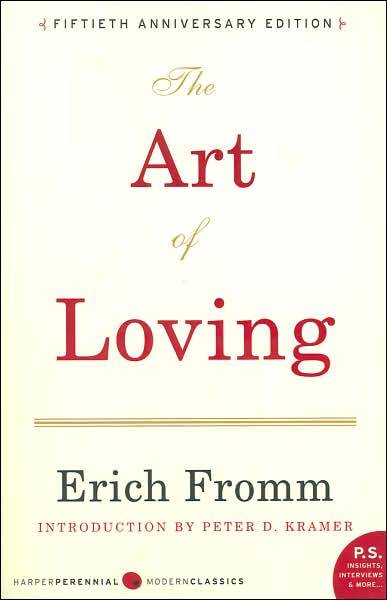
It wants to convince the reader that all his attempts for love are bound to fail, unless he tries most actively to develop his total personality, so as to achieve a productive orientation; that satisfaction in individual love cannot be attained without the capacity to love one’s neighbor, without true humility, courage, faith and discipline. In a culture in which these qualities are rare, the attainment of the capacity to love must remain a rare achievement. (Preface)
The experience of separateness arouses anxiety; it is, indeed, the source of all anxiety. Being separate means being cut off, without any capacity to use my human powers. Hence to be separate means to be helpless, unable to grasp the world -things and people- actively; it means that the world can invade me without my ability to react. Thus, separateness is the source of intense anxiety. Beyond that, it arouses shame and the feeling of guilt. This experience of guilt and shame in separateness is expressed in the Biblical story of Adam and Eve. (8)
The awareness of human separation, without reunion by love- is the source of shame. It is at the same time the source of guilt and anxiety. (9)
… since the sexual act without love never bridges the gap between two human beings, except momentarily. (12)
But actually, people want to conform to a much higher degree than they are forced to conform, at least in the Western democracies.
Most people are nor even aware of their need to conform. They live under the illusion that they follow their own ideas and inclinations, that they are individuals, that they have arrived their opinions as the result of their own thinking – and that it just happens that their ideas are the same as those of the majority. The consensus of all serves as a proof for correctness of “their” ideas. Since there is still a need to feel some individuality, such need is satisfied with regard to minor differences; the initials on the handbag or the sweater, the name plate of the bank teller, the belonging to the Democratic as against the Republican party, to the Elks instead of to the Shriners become the expression of individual differences. The advertising slogan of “it is different” shows up this pathetic need for difference, when in reality there is hardly any left. (13)
In contemporary capitalistic society the meaning of equality has been transformed. By equality one refers to the equality of automatons; of men who have lost their individuality. Equality today means “sameness” rather than “oneness”. (14)
The proposition of Enlightenment philosophy, l’ame n’a pas de sexe, the soul has no sex, has become the general practice. (…) Just as modern mass production requires the standardization of commodities, so the social process requires standardization of man, and this standardization is called “equality.” (…) In addition to conformity as a way to relieve the anxiety springing from separateness, another factor of contemporary life must be considered: the role of the work routine and of the pleasure routine. (15)
A third way of attaining union lies in creative activity, be it that of the artist, or of the artisan. (16)
The passive form of symbiotic union is that of submission, or if we use a clinical term, of masochism. The masochistic person escapes from the unbearable feeling of isolation and separateness by making himself part and parcel of another person who directs him, guides him, protects him; who is his life and his oxygen, as it were. The power of the one to whom one submits is inflated, may he be a person or a god; he is everything, I am nothing, except inasmuch as I am part of him. (…)
The active form of symbiotic fusion is domination or, to use the psychological term corresponding to masochism, sadism. The sadistic person wants to escape from his aloneness and his sense of imprisonment by making another person part and parcel of himself. He inflates and enhances himself by incorporating another person, who worships him. The sadistic person is as dependent on the submissive person as the latter is on the former; neither can live without the other. The difference is only that the sadistic person commands, exploits, hurts, humiliates and the masochistic person is commanded, exploited, hurt, humiliated. This is a considerable difference in a realistic sense; in a deeper emotional sense, the difference is not so great as that which they both have common: fusion without integrity. (18-19)
Love is an activity, not a passive affect; it is a “standing in,” not a “falling for.” (21)
Love is the active concern for the life and the growth of that which we love. (25)
Care and concern imply another aspect of love; that of responsibility. Today responsibility is often meant to denote duty, something imposed upon one from the outside. But responsibility, in its true sense, is an entirely voluntary act; it is my response to the needs, expressed or unexpressed, of another human being. To be “responsible” means to be able and ready to “respond.” (…)
Responsibility could easily deteriorate into domination and possessiveness, were it not for a third component of love, respect. Respect is not fear and awe; it donates, in accordance with the woot of the word (respicere = to look at), the ability to see a person as he is, to be aware of his unique individuality. Respect means the concern that the other person should grow and unfold as he is. (26)
Respect exists only on the basis of freedom: “l’amour est l’enfant de la liberte” as and old French song says; love is the child of freedom, never that of domination. (27)
The idea of this polarization is most strikingly expressed in the myth that originally man and woman were one, that they were cut in half, and from then on each male has been seeking for lost female part of himself in order to unite again with her. (…)
The polarity between male and female principles exists also within each man and each woman. Just as physiologically man and woman each have hormones of the opposite sex, they are bisexual also in the psychological sense. They carry in themselves the principle of receiving and penetrating, of matter and of spirit. Man -and woman- finds union within himself only in the union of his female and his male polarity. This polarity is the basis for all creativity. (…) the homosexual deviation is a failure to attain this polarized union, and thus the homosexual suffers from the pain of never-resolved separateness; a failure, however which he shares with the average heterosexual who cannot love. (31)
In fact, erotic attraction is by no means only expressed in sexual attraction. There is masculinity and femininity in character as well as in sexual function. The masculine character can be defined as having the qualities of penetration, guidance, activity, discipline and adventurousness; the feminine character by qualities of productive receptiveness, protection, realism, endurance, motherliness. (It must always be kept in mind that in each individual both characteristics are blended, but with the correspondence of those appertaining to “his” or “her” sex. (…)
Very often if the masculine character traits of a man are weakened because emotionally, he has remained a child, he will try to compensate for this lack by exclusive emphasis on his male role in sex. The results is the Don Juan, who needs to prove his male prowess in sex because he is unsure of his masculinity in a characterological sense. (…) If the feminine sexuality is weakened or perverted, it is transformed into masochism, or possessiveness. (34-35)
By loving, he has left the prison cell of aloneness and isolation which was constituted by the state of narcissism and self-centeredness. (…) Infantile love follows the principle: “I love because I am loved.” Mature love follows the principle: “I am loved because I love.” Immature love says: “I love you because I need you.” Mature love says: “I need you because I love you.” (38)
Furthermore, “deserved” love easily leaves a bitter feeling that one is not loved for oneself, that one is loved only because one pleases, that one is, in the last analysis, not loved but used. (39)
One cause for neurotic development can lie in the fact that a boy has a loving, but overindulgent or domineering mother, and a weak and uninterested father. In this case he may remain fixed at an early mother attachment, and develop into a person who is dependent on mother, feels helpless, has the striving characteristic of the receptive person, that is, to receive, to be protected, to be taken care of, and who has a lack of fatherly qualities – discipline, independence, an ability to master life by himself. He may try to find “mothers” in everybody, sometimes in women and sometimes in men in a position of authority and power. If, on the other hand, the mother is cold, unresponsive and domineering, he may either transfer the need for motherly protection to his father, and subsequent father figures – in which case the end result is similar to the former case- or he will develop into a one-sidedly father oriented person, completely given to the principles of law, order and authority, and lacking in the ability to expect or to receive unconditional love. This development is further intensified if the father is authoritarian and at the same time strongly attached to the son. What is characteristic of all these neurotic developments is the fact that one principle, the fatherly or motherly, fails to develop or – and this is the case in the more severe neurotic development – that the roles of mother and father become confused both with regard to persons outside and with regard to persons outside and with regard to these roles within the person. Further examination may show that certain types of neurosis, like obsessional neurosis, develop more on the basis of a one-sided father attachment, while others, like hysteria, alcoholism, inability to assert oneself and to cope with life realistically, and depressions, result from mother-centeredness. (42)
Love is not primarily a relationship to a specific person; it is an attitude, an orientation of character which determines the relatedness of a person to the world as a whole, not toward one “object” of love. If a person loves only one other person and is indifferent to the rest of his fellow men, his love is not love but a symbiotic attachment, or an enlarged egotism. Yet, most people believe that love is constituted by the object, not by the faculty. In fact, they even believe that it is a proof of the intensity of their love when they do not love anybody except the “loved” person. (…) If I truly love one person I love all persons, I love the world, I love life. If I can say to somebody else, “I love you,” I must be able to say, “I love in you everybody, I love through you the world, I love in you also myself.” (43)
Here lies the basic difference to erotic love. In erotic love, two people who were separate become one. In motherly love, two people who were one become separate. The mother must not only tolerate, she must wish and support the child’s separation. (48)
First of all, it is often confused with the explosive experience of “falling: in love, the sudden collapse of the barriers which existed until that moment between two strangers. But, as was pointed out before, this experience of sudden intimacy is by its very nature short-lived. (49)
If the desire for physical union is not stimulated by love, if erotic love is not also brotherly love, it never leads to union in more than an orgiastic, transitory sense. (51)
If love were only a feeling, there would be no basis for the promise to love each forever. A feeling comes and it may go. How can I judge that it will stay forever, when my act does not involve judgement and decision? (52)
Let us first speak of the development from mother centered to father centered religions. According to the great and decisive discoveries of Bachofen and Morgan in the middle of the nineteenth century, and in spite of the rejection their findings have found in most academic circles, there can be little doubt that there was a matriarchal phase of religion preceding the patriarchal one, at least in many cultures. In the matriarchal phase, the highest being is the mother. She is the goddess, she is also the authority in family and society. In order to understand the essence of matriarchal religion, we have only to remember what has been said about the essence of motherly love. Mother’s love is unconditional, it is all-protective, all-enveloping; because it is unconditional, it can also not be controlled or acquired. Its presence gives the loved person a sense of bliss; its absence produces a sense of lostness and utter despair. Since mother loves her children because they are her children, and not because they are “good,” obedient, or fulfill her wishes and commands, mother’s love is based on equality. All men are equal, because they all are children of a mother, because they all are children of Mother Earth. (60-61)
The truly religious person, if he follows the essence of the monotheistic idea, does not pray for anything, does not expect anything from God; he does not love God as a child loves his father or his mother; he has acquired the humility of sensing his limitations, to the degree of knowing that he knows nothing about God. (66)
This logic is based on the law of identity which states that A is A, the law of contradiction (A is not non-A) and the law of the excluded middle (A cannot be A and non-A, neither A nor non-A). Aristotle explains his position very clearly in the following sentence: “It is impossible for the same thing at the same time o belong and not to belong to the same thing and in the same respect; and whatever other distinctions we might add to meet dialectical objections, let them be added. This, then, is the most certain of all principles …” (…)
In opposition to Aristotelian logic is what one might call paradoxical logic, which assumes that A and non-A do not exclude each other as predicates of X. Paradoxical logic was predominant in Chinese and Indian thinking, in the philosophy of Heraclitus, and then again, under the name of dialectics, it became the philosophy of Hegel, and of Marx. The general principle of paradoxical logic has been clearly described by Lao-tse. “Words that are strictly true seem to be paradoxical.” (…)
(Heraclitus) assumes the conflict between opposites is the basis of all existence. “They do not understand,” he says, “that the all-One, conflicting in itself, is identical with itself: conflicting harmony as in the bow and in the lyre.” (67-69)
“We look at it, and we do not hear it, and we name “Equable.” We listen to it, and we do not hear it, and we name it the “Inaudible.” We try to grasp it, and do not get hold of it, and we name it the “Subtle.” With these three qualities, it cannot be made the subject of description; and hence we blend them together and obtain The One.” (…)
But paradoxical philosophy is neither in India not in China to be confused with a dualistic standpoint. The harmony (unity) consist in the conflicting position from which it is made up. (70)
Inasmuch as God represents the ultimate reality, and inasmuch as the human mind perceives reality in contradictions, no positive statement can be made of God. (…) Man can only know the negation, never the position of ultimate reality. “Meanwhile man can not know what God is, even though he be ever so well aware of what God is not…” (71)
The teachers of paradoxical logic say that man can perceive reality only in contradictions, and can never perceive in thought the ultimate reality-unity, the One itself. This led to the consequence that one did not seek as the ultimate aim to find the answer in thought. Thought can only lead us to the knowledge that it cannot give us the ultimate answer. The world of thought remains caught in the paradox. The only way in which the world can be grasped ultimately lies, not in thought, but in act, in the experience of oneness. Thus paradoxical logic leads to the conclusion that the love of God is neither the knowledge of God in thought, not the thought of one’s love of God, but the experiencing the oneness with God. (72)
Secondly, the paradoxical standpoint led to the emphasis on transforming man, rather than to the development of dogma on the one hand, and science on the other. From the Indian, Chinese and mystical standpoints, the religious task of man is not to think right, but to act right, and/or to become one with the One in the act of concentrated mediation. (73)
The emphasis on thought has also another and historically a very important consequence. The idea that one could find the truth in thought led not only to dogma, but also to science. (…) In the dominant Western religious system, the love of God is essentially the same as the belief in God, in God’s existence, God’s justice, God’s love. The love of God, is essentially a thought experience. (…) In the stage of full maturity he has freed himself from the person of mother and of father as protecting and commanding powers; he has established the motherly and fatherly principles in himself. He has become his own father and mother; he is farher and mother. In the history of the human race we see -and can anticipate- the same development: from the beginning of the love for God as the helpless attachment to a mother Goddess, through the obedient attachment to a father God, to a mature stage where God ceases to be an outside power, where man has incorporated the principles of love and justice into himself, where he has become one with God, and eventually, to a point where he speaks of God only in a poetic, symbolic sense. (73-74)
Love for man, furthermore, while directly embedded in his relations to his family, is in the last analysis determined by the structure of the society in which he lives. (76)
Shoes, useful and needed as they may be, have no economic value (exchange value) if there is no demand for them on the market; human energy and skill are without exchange value if there is no demand for them under existing market conditions. (78)
Our character is geared to exchange and to receive, to barter and to consume; everything, spiritual as well as material objects, becomes an object of exchange and of consumption. (81)
One of the most significant expressions of love, and especially of marriage with this alienated structure, is the idea of the “team.” In any number of articles on happy marriage, the ideal described is that of the smoothly functioning team. This description is not too different from the idea of a smoothly functioning employee; he should be “reasonably independent,” cooperative, tolerant, and at the same time ambitious and aggressive. Thus, the marriage counselor tells us, the husband should “understand” his wife and be helpful. He should comment favorably on her new dress, and on a tasty dish. She, in turn, should understand when he comes home tired and disgruntled, she should listen attentively when he talks about his business troubles, should not be angry but understanding when he forgets her birthday. All this kind of relationship amount to is the well-oiled relationship between two persons who remain strangers all their lives, who never arrive at a “central relationship,” but who treat each other with courtesy and who attempt to make each other feel better. (81)
It fitted the general illusion of the time to assume that using the right techniques is the solution not only to technical problems of industrial production, but of all human problems as well. (82)
Fear of or hatred for the other sex are at the bottom of those difficulties which prevent a person from giving himself completely, from acting spontaneously, from trusting the sexual partner in the immediacy and directness of physical closeness. (83)
In order to prove that capitalism corresponded to the natural seeds of man, one had to show that man was by nature competitive and full of mutual hostility. While economists “proved” this in terms of the insatiable desire for economic gain, and the Darwinists in terms of the biological law of the survival of the fittest, Freud came to the same result by the assumption that man is driven by a limitless desire for the sexual conquest of all women, and that only the pressure of society prevented man from acting on his desires. (84-85)
It is remarkable that Sullivan speaks here of expressed needs, when the least one could say about love is that it implies a reaction to unexpressed needs between two people. (87)
Their aim is to loved, not to love. There is usually a good deal of vanity in this type of man, more or less hidden grandiose ideas. If they have found the right woman, they feel secure, on top of the world, and can display a great deal of affection and charm, and this is the reason why these men are often so deceptive. But when, after a while, the woman does not continue to live up to their phantastic expectations, conflicts and resentment start to develop. If the woman is not always admiring them, if she makes claims for a life of the own, if she wants to be loved and protected herself, and in extreme cases, if she is not willing to condone his love affairs with other women (or even have an admiring interest in them), the man feels deeply hurt and disappointed, and usually rationalizes this feeling with the idea that the woman “does not love him, is selfish, or domineering.” Anything short of the attitude of a loving mother toward a charming child is taken as proof of a lack of love. These men usually confuse their affectionate behavior, their wish to please, with genuine love and thus arrive at the conclusion that they are being treated quite unfairly; they imagine themselves to be the great lovers and complain bitterly about the ingratitude of their love partner. (89)
Mother can give life, and she can take life. She is the one to revive, and the one to destroy; she can do miracles of love – and nobody can hurt more than she. In religious images (such as the Hindu goddess Kali) and in dream symbolism the two opposite aspects of mother can often be found. (90)
Needless to say it is not rare that two persons find each other in a mutual idolatry which, sometimes, in extreme cases, represents the picture of folie a deux. (…) As long as love is a daydream, they can participate; as soon as it comes down to the reality of the relationship between two real people – they are frozen. (…) This tendency coincides with a general attitude characteristic of modern man. He lives in the past or in the future, but not in the present. He remembers sentimentally his childhood and his mother – or he makes happy plans for the future. (93)
Any detailed study would show, however, that the atmosphere of tension and unhappiness within the “unified family” is more harmful to the children than an open break would be – which teaches them at least that man is able to end an intolerable situation by a courageous decision. (95)
Love, experienced thus, is a constant challenge; it is not a resting place, but a moving, growing , working together; even whether there is harmony or conflict, joy or sadness, is secondary to the fundamental fact that two people experience themselves from the essence of their existence, that they are one with each other by being one with themselves, rather than by fleeing from themselves. There is only one proof for the presence of love: the depth of the relationship, and the aliveness and strength in each person concerned; this is the fruit by which love is recognized. (96)
By irrational faith I understand the belief (in a person or an idea) which is based on one’s submission to irrational authority. In contrast, rational faith is a conviction which is rooted in one’s own experience of thought of feeling. Rational faith is not primarily belief in something, but the quality of certainty and firmness which our convictions have. Faith is a character trait pervading the whole personality, rather than a specific belief. (112)
We are aware of the existence of a self, of a core in our personality which is unchangeable, and which persists throughout our life in spite of varying circumstances, and regardless of certain changes in opinions and feelings. It is the core which is the reality behind the word “I.” and on which our conviction of our own identity is based. Unless we have faith in the persistence of our self, our feeling of identity is threatened and we become dependent on other people whose approval then becomes the basis for our feeling of our identity. (114)
Because of the fact that faith and power are mutually exclusive, all religions and political systems which originally are built on rational faith become a=corrupt and eventually lose what strength they have, if they rely on power or ally themselves with it.
To have faith requires courage, the ability to take a risk, the readiness even to accept pain and disappointment. Whoever insists on safety and security as primary conditions of life cannot have faith; whoever shuts himself off in a system of defense, where distance and possession are his means of security, makes himself a prisoner. (117)
To love means to commit oneself without guarantee, to give oneself completely in the hope that our love will produce love in the loved person. Love is an act of faith, and whoever is of little faith is also of little love. (118)
Fairness meaning not to use fraud and trickery in the exchange of commodities and services, and in the exchange of feelings. “I give you as much as you give me,” in material goods as well as in love, is the prevalent ethical maxim in capitalist society. It may even be said that the development of fairness ethics is the particular ethical contribution of capitalist society. (119)
But the practice of love must begin with recognizing the difference between fairness and love. (120)
They arrive at the result that to speak of love today means only to participate in the general fraud; they claim that only a martyr or a mad person can love in the world of today, hence that all discussion of love is nothing but preaching. (121)
All activities are subordinated to economic goals, means have become ends; man is an automaton -well fed, well clad, but without any ultimate concern for that which is his peculiar human quality and function. If man is to able to love, he must be put in his supreme place. The economic machine must serve him, rather than he serve it. He must be enabled to share experience, to share work, rather than, at best, share profits. Society must be organized in such a way that man’s social, loving nature is not separated from his social existence, but becomes one with it. (…) to have faith in the possibility of love as a social and not only exceptional-individual phenomenon, is a rational faith based on the insight into the very nature of man. (123)
#erich fromm#psychotherapy#socialogy#book#the art of loving#review#quotations#remarks#motherly love#freud#fatherlylove#maturelove#godlove#phylosophy#frankfurt school#frankfurt ecole#fromm#love#reciprocity#rationality#paradoxial phylosophy#heraklitos#aristotales
6 notes
·
View notes
Text
To Lay a Trap
Not every story has a happy ending. Certainly where supreme power exists, there too lies heartache. When Ningu arranges for something to happen, it does. The amount of power he holds has been noticed on a global scale, and there are those who clamor for his death.
The upper echelon of the Dengedian League had taken seats on bleachers along the periphery of the lab. He noted that Alysso, a staunch opposer of his policies, looked unnerved by the clutch. He cautiously looked around the room at the posted guards and their augmented firearms. Alysso was the head of the project, under Ningu himself. He knew the awesome potential of this weapon. Ningu suspected the young man would try to do something to interfere with the experiment. Fear was natural, he just didn't have time for it.
Ningu was the last to take his seat on a raised platform overlooking the lab below. It smelled of lemon and other cleaning agents, mixed with the wet dog smell of the N'iti. He raised his hand, and the room went quiet. Using practiced hand motions, he formed a single rune in the air. Then, he resonated with the timbre of the unmarked tempest crystal in his atmospheric crystal processor. “The great war has begun,” his voice boomed, amplifying the air by the cast rune. “Do not mistake my words, it is a war for us all; the soul of mankind.” Several from his military cabinet were nodding their head in agreement. “Before I manifested myself in the flesh, you knew me only by name and story. Now you have experienced the life-enriching change that believing in me brings.” Now, most of his scientists seemed to be agreeing. Since his ascent, science at large within the Dengedian held territories had progressed at a staggering pace. The information he bestowed to the states filled in their gaps in knowledge. He taught them about physics, thermodynamics, and genetics. Most importantly he taught them about crystal law, which they knew nothing about.
“Praise Lord Ningu!” Cried many in the ground bowing toward him. Seeing some do this, the rest followed suit. He smiled behind his mask. Yes, grovel before your god. Pathetic creatures.
“My lord,” came a voice from the crowd. Alysso was not bowing. He stood staring directly at Ningu. There was no trace of his previous apprehension now. “What of those who would stand against you? Is it worth the cost in lives?” A suddenly panicked whisper tore through the still-bowing crowd. Had he just challenged a god?
Ningu indicated to the sentinel at the center of the N’iti clutch to begin the experiment. They had only found a small amount of smith crystal; not enough to create orichalcum metal, but enough to perform several trials and construct ACP’s.
“I understand why you ask, Alysso” he replied. He was a god, or so they thought. As such, his voice needed to convey no emotion. All sound ceased. Guards drew closer to Alysso, expecting him to do something brash. “The fact of the matter is that you fail to understand the principles of N’iti consumption. “Simply put, they are a race whose biology changes when fed crystal.” From the tank on the sentinels back the liquefied smith crystal oozed through the tubes, stretching toward the jackals. “I know everything about crystal, Alysso. I created crystal law and its equivalent computing sciences.” He hadn’t of course. He had written several discourses on crystal genetic theory and had led the world’s leading artificers in runic discoveries. “When liquefied smith crystal is introduced into the N’iti’s blood, the creature becomes…pliable,” he explained. The liquid reached the N’iti and poured into their blood. They began to buck wildly, pulling at their restraints. Alarmed, they spoke in their guttural language, waking from their stupor. Bulbous pustules formed on their bodies and continued to grow until they burst. Ningu was disgusted by the creatures he had once feared a lifetime ago. Their bones moved beneath their skin as they howled in pain, falling to the ground. Their bodies began to rebuild themselves. “You understand, Alysso,” he continued. “As well as your comrades, that the nations will band against a power like ours. Therefore, it is in our best interest to end the struggle swiftly.” Jackals no longer howled. Alysso looked stricken with fear. New N’iti warriors stood in place of the old. The flesh of their heads had melted away to reveal the milky white of their exposed skulls, the only remnant of their previous forms. From the neck down billowed black smoke like a mantle. The tubes which had fed them smith crystal now looked like tendrilled leashes connecting them to the sentinel who hovered several feet above the ground.
Ningu watched as the cabinet members cowered before the display. They were insects cowering before the boot. A sudden cry cut through the moment as Alysso charged toward Ningu’s raised platform. “You can’t do this!” He shouted. Instead of attacking Alysso, the guards surprisingly turned on each other. Some attacked the changed N’iti. Ningu laughed, his voice still projected. He had expected this.
The bullets failed to reach the N’iti, colliding with an invisible barrier of air created by the sentinel. It prompted the jackals to attack through their ethereal connection. A feeling of agony Ningu had long since learned to counter, brought those around him to the ground. The N’iti had entered the mind of everyone present, excluding himself. He addressed the lab as the sentinel and its N’iti stood erect. “Alysso, you may be wondering what exactly you’re experiencing. The N’iti become pliable when the crystal is introduced into their bloodstream, as I’ve pointed out. With smith crystal specifically, they become psionic. Their lives become an endless torment. This is why they project those emotions into the minds of others.” Everyone, from his commanders to his scientists lay on the cold floor with hollow looks in their eyes. They stared at nothing, mouths agape, screaming in anguish. “This is what will await those who oppose me and my people, eternal suffering.” He waited a few more seconds before giving the signal. From the N’iti shroud’s emerged tendrils like hands in which formed blades wreathed in flames. The jackals moved around the room, killing all those who had attacked. Alysso, he spared, intending for him a darker fate. Then the N’iti psionic attack ended as abruptly as it had begun. “The enemy will not overcome what I have created,” he smiled in satisfaction.
As those not involved in the attack recovered they praised his foresight and feared his wrath. They chanted his name hoarsely. Yes, to these humans, he was a god.
0 notes
Text
An Application of Darwinian Romanticism to Mary Shelley’s Frankenstein
What can be said of the story which birthed the notion of the mad scientist? Amongst those novels to which we attribute the designation of being ‘groundbreaking,’ Mary Shelley’s revised version of Frankenstein, as published in 1831, remains the most prolific of the Gothic Romantic era. As was the case with others of its time, Frankenstein dealt heavily with themes of nature, of humanity, of the macabre, and of the supernatural. Its addressing of these elements, however, was explained by way of valid, scientific inquiry, and was a product of the Romantic belief that anything was possible through indefatigable scientific application. These scientific elements were, in a literary context, representative of possibility which must be tempered by morality. Within Frankenstein, this belief is especially manifested in the relationship Victor Frankenstein establishes with nature. Frankenstein, therefore, makes use of the literary Romantic adherence to the Darwinian school of naturphilosophie for the purpose of exploring the consequences of incurring its sanctions.
In order to facilitate satisfactory comprehension of the subject matter, it must first be implicitly understood what is meant by ‘naturphilosophie,’ and it must secondly be understood what entails its Darwinian methodology. Naturphilosophie is, overall, a conglomerate of scientific and philosophical belief which combines elements of alchemy and of practical sciences, such as chemistry, and which dictates that there is present within nature certain immutable laws that can be either exploited or respected by mankind. It is upon this last point that the two primary schools of naturphilosophie diverge. Those who follow the teachings of Francis Bacon believe that nature is a tool which may rightfully be harnessed and exploited by mankind for the sake of its own understanding, dominance, and benefit. Within Mary Shelley’s Frankenstein, this view is best expressed by lecturer M. Waldman, to whom Victor is exposed in an academic setting, when speaking of natural philosophers: “They penetrate into the recesses of nature, and show how she works in her hiding places. […]. They can command the thunders of heaven, mimic the earthquake, and even mock the invisible world with its own shadows” (Shelley 36). Darwinian naturphilosophie, however, commands that its adherents respect nature, above all else. It is believed, in brief summation, by the Darwinian philosophers that nature functions as a destroyer and as a healer, that change within nature should be a slow and natural process, that scientists should observe change rather than affect it themselves, that procreation requires the participation of a male and a female organism, and that failure to respect nature results in the smiting of the transgressor. It is to this school of natural philosophy that Shelley subscribed, and it is within the context of this belief system that Frankenstein operates. Victor Frankenstein violates each of its rules, and in doing so seems more, initially, to pursue the Baconian model than the Darwinian.
The formermost of these ideas, that nature functions simultaneously as a destroyer and as a healer, is discovered chiefly in its interaction with Victor Frankenstein. It is continually within nature that he remarks having found solace; it is within nature, on his various long journeys, that he finds himself healed of his mental anguish and is left, in its stead, awed by the beauty of his native country. In that regard, nature restores him; nature, in its simplicity and its majesty, bestows upon him the gift it bestows upon all who wish merely to exist within it. However, his downfall may likewise be directly accredited to his transgressions against nature. It is only upon the occasion that Victor tries to harness its power that he finds himself thrust into melancholy and despair, into violence and loss. It is, ironically, the very life he has created that has spited nature which brings about his misery. It is the creature, in his acts of redress, who murders his brother, his best friend, and his wife; it is the fruits of his labour in creating life that enacts death upon those close to Victor. In order to further this point, Shelley includes within the novel the interruption of Victor’s natural restoration by the aberration he has created. Upon one of his retreats into the wilderness, Victor observes, racing upon the snow, the creature moving toward him at a speed which too defies natural ability: “I suddenly beheld the figure of a man, at some distance, advancing towards me with superhuman speed” (85). It is aptly ironic that the peace Victor once sought in nature is denied him by the precipitate of his violation of it.
The second and third of these ideas, that change within nature ought to be a slow and natural process and that scientists ought to be passive in observing change within it, are likewise cast to the wayside by the selfish, human ambition of Victor Frankenstein. The chiefest of his insults is manifested in his refusal even to allow that change to occur within living members of a species; rather, Victor awaits the darkening of the skies, and takes to the place within which the deceased repose in order to obtain the means for his end. It is from these disparate parts that Victor comprises his creation; it is from several of the deceased that he stitches together his abomination. Therefore, not only does he insult nature in his refusal to allow the process to be slow, but rather refuses it the ability even to arise from whole organisms. In regards to the speed of the process, though Victor spends an extraordinary amount of time searching for the components of his experiment themselves, and deducing the manner with which he may even imbue a non-living entity with life, there is neither a period of sexual selection nor of gestation. The creature is not borne of a generational line of preferable characteristics, selected by generations of careful breeding and of trial-and-error, but rather is created as he is, with no gradual change in the appearance of his species harkening back to earlier incarnations. He is created within a single night, and therefore subverts the process of sexual selection and of gradual change. The fault, however, lies not with him, but with his creator; Victor Frankenstein knowingly, and willingly, trespassed against the laws of nature and therefore birthed something which would repulse those who had come to be by way of proper methods. It is in this willful transgression that Victor Frankenstein likewise violates the mandate that scientists ought only to observe change within species; he, in extremity of purpose, affects such drastic change that he creates an entirely new breed of being. In doing so, he condemns not only himself to a life of misery and of natural wrath, but that which he created and which exists as an offense to nature. It is based upon these facts that the pair of them suffer; it is based upon these facts that the creation abhors his creator, and later is himself eradicated.
The final pair of these commands, that living organisms require a male and a female parent and that nature must, above all else, be respected, are too tread upon by Victor Frankenstein. This may chiefly be observed in the fact that Victor Frankenstein was, in a manner of speaking, a single parent; he created the being without the natural participation of a female partner. He, a singular male, created life of his own volition; such is, according to natural law, disallowed. Any man, or woman, who creates life of themselves and without the aid of their biological opposite, is complicit in birthing an abomination. The creature, however, seems to be more attuned to nature than his creator, and seeks to partner himself with a female, as is ordained by natural law. Victor, though initially compliant, soon reconciles himself with this aforementioned law and recognises the greatest danger in allowing his creation a female mate: “the first results of those sympathies for which the daemon thirsted would be children, and a race of devils would be propogated upon the earth” (149-150). That is to say, had Victor granted the being his request, he would have been made to observe nature correct itself and would have observed the natural engenderment of a new species. Victor, ever one to defy the will of nature, denies the creature his request, and is again made to suffer for his obstinance and his ignorance in the face of natural decree. In regards to the final commandment, in which it is declared that nature must be respected, such is violated by the young philosopher in every way it can have been. In brief summation, Victor elected to pursue the corrupt Baconian notion that nature ought to be harnessed for the sake of the benefit of mankind; he decided, in a phrase, to play God. However, as Shelley herself was a faithful devotee to the Darwinian model of natural philosophy, such selfishness brought about the wrath of a scorned nature, which rightfully asserted itself as holding power over the ignorant ambitions of a singular man. In disrespecting nature, Victor brought about his own downfall.
It is therefore abundantly and inarguably apparent that Frankenstein, in exploring the consequences of an individual who sought to defile each of the laws firmly established by the Darwinian model of naturphilosophie, endeavours to instill within its readers a sense of obligation in regards to respecting nature. It is in the inability of Victor to comprehend that nature is both healer and destroyer, to allow the process of change to occur gradually and without affectation, to ally himself with a female partner in the procreation of his species, and to, most importantly, respect the power of nature that he finds himself deposed from his glory and resigned to a pathetic death in the Arctic landscape, within which nature establishes its greatest demesne. In the Darwinian supposition, and assertion, of Shelley, had Victor Frankenstein continued to pursue a model of naturphilosophie which tempered possibility with morality, he should never have outraged nature and would have, in his turn, never have suffered so tremendously. It is by man’s own hand that he is ruined.
Sources used:
Shelley, Mary. “Frankenstein.” Collins Classics, 2010.
17 notes
·
View notes
Photo
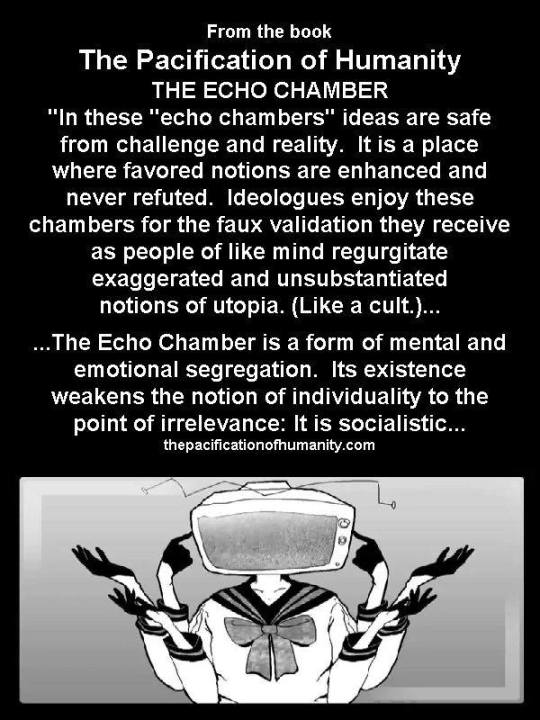
STEP OUT OF YOUR BOX AND ENJOY THE FREE READ!!!!!!!!!!!!!!!!!!!!!!!!
Here is just a small sample of the book's tone, flavor and focus. You will be hearing a lot about the Echo Chamber in the coming days!
THE ECHO CHAMBER
The above described groups known now as "cultural bullies" can only thrive in a vacuum. In order for them to make their ideologies seem feasible they develop "safe zones." (Heard that term lately?) These "safe zones" are not safe for you; they are safe for their ideology. These "safe zones" are a place for their
23
unchallenged ideas to fester. These incubators for baby ideologues are known by many sociologists as "echo chambers." This is a figurative place where the only voices that will be spoken and heard openly are the voices of people who perpetuate the same party lines. The only people the echo chamber's inhabitants ever hear from are the voices of those people who think like they do and subscribe to their same belief systems. In these "echo chambers" ideas are safe from challenge and reality. It is a place where favored notions are enhanced and never refuted. Ideologues enjoy these chambers for the faux validation they receive as people of like mind regurgitate exaggerated and unsubstantiated notions of utopia. (Like a cult.) In this safe place, the Echo Chamber ideals can be championed without scrutiny. The application of critical thought is never applied. The echo chamber is "in the Box" thinking personified. By operating in the dark quarantine of the chamber ideas are safe from challenge and doubt. They are safe from the light of scrutiny. In the chamber these ideological pathogens can fester in the minds of its inhabitants until an immunity to counter perspectives can be developed. Their seclusion allows the indoctrination process to fully develop as its carriers prepare to spread their agenda outward. In the chamber the birthing of the pseudo intellectual develops and they are raised up to be self righteous cultural bullies. In essence these chambers allow for a foundation of thought to solidify before ever being tested or proven. Since there is no dissent in the chamber, there is no doubt, only validation. It is comparable to science without research; nothing but theory and no way to be proven wrong. Ironically enough the ideals that develop in the chamber become beliefs before they can even be improved upon. It's like bad cement made without all the right elements and proportions. It may seem strong but when the
24
realities of the world and life itself apply pressure the notions crumble. These untested ideas often fail in catastrophic ways for the individual naive enough to have been co-opted into the cult structure. The chamber allows for half baked ideas to seem very solid. The residents of the chamber are able to seemingly strengthen their resolve in regards to their beliefs simply by the support and validation they receive from other members. This lack of scrutiny is what makes them "feel" overly righteous in their beliefs. The pathetic part is that it makes them feel more intelligent and more informed then they are. The truth is that their quarantine has denied them the real growth potential of their ideas, the strength that scrutiny might have contributed. In science an idea must be tested and validated; most often by people who don't believe in the theory. The echo chamber guards against these counter perspectives just like a cult. Politically, the chamber is a way to protect the party line and a major reason why cults of all kind separate themselves from the ideas of others. (Next time you watch a National Party Convention step back and just watch the members swirl in their little chamber of self righteousness.) Outside influences are very carefully vetted to make sure they will not "contaminate" the chamber with conflicting information. (Next time you're in a conversation about politics or on a college campus step back and just watch the members play out their mental masturbations of self reassurance.) Perhaps you'll see this occur at your job. In many of these groups there is a vetting process for those who are allowed to speak. The approval process is not a way to determine experience; the process is only concerned in proving that participants are "Like Minded." The chamber is a means of preserving the self-deception of the inhabitants. These "Echo Chambers" are a serious
25
intellectual problem in the world today. The Wiki defines the media version of the echo chamber as follows: "an echo chamber is a situation in which information, ideas, or beliefs are amplified or reinforced by transmission and repetition inside an "enclosed" system, where different or competing views are censored, disallowed or otherwise underrepresented."
I hope that this definition scares you a little but I'd rather it disturb you. The concept of the echo chamber was originally popularized in the late 90's but due to the media's complicity in the problem they have squashed the insight lest they be found out. These echo chambers are overly represented in our modern lives. They are becoming a major problem for any group with opposing insights. Ideological clashes are now growing in number due to the increased frequency of social exchanges now taking place. The chamber has become too large to vet the inhabitants and they are now being confronted with the impossibility of their own delusions. As alluded to above, the two most favored breeding grounds for the echo chamber are the college campus and the mainstream media on both sides. Large exposure or the "number of views" is not necessary; as the chamber also exists in the form of letters, emails, texting, page posts, word of mouth and good old fashioned leaflet propaganda. If one group were to control a country's information and data, the entire country could very easily become a Petri dish of these untested contagions. The Echo Chamber is a form of mental and emotional segregation. Its existence weakens the notion of individuality to the point of irrelevance: It is socialistic. A brief example might be a group of people who claim to be racially tolerant yet live in a guarded and gated community where they restrict who can enter and even who might be able to live there. The community organization is a place where tolerance works unless you are on
26
their undesirable list. People in these communities may even believe that there is less crime than is reported because they are not subjected to real world threats. No one in the community would suggest the locked gate is a form of segregation. The people living in that type of community may have even convinced themselves that they have no racial bias, yet they are quick to lock their car doors when they leave their compounds. The darker side I want to be clear here that these Echo Chamber groups can also be very extreme organizations ranging from the KKK to ISIS. Yes even terrorist groups operate in an echo chamber, they must. Their segregation is how they can come to believe such insane notions like modern day Jihad and that beheadings are beneficial to their cause. Their echo chambers have allowed them to remain 1500 years in the past! In fact these terrorist cults are a perfect example of how to get a group of people to follow you "blindly." Cut your members off from all media except your own, use intimidation, burn the other peoples' books, kill anyone who voices a contrary opinion or theory and repeat your ideology over and over again. Demand that your members repeat your ideology from memory or DIE! (Sound familiar?) Reward compliance and suggest a moral high ground or eternal place for the righteous in this life and the next. (Not sure how 72 virgins is paradise, but that is what they have been sold and that is what they have bought.) Adjust the gain Perhaps the scariest thing about these echo chamber groups is that once a person is ac-"cult"-urated into the group the newly embraced "groupie" experiences acceptance and regular validation for their allegiance and subjectification. From a behavioral standpoint this a reward process that continually reinforces allegiance; constantly strengthening the bond. This
27
behavioral conditioning becomes subconscious, meaning that the conditioned subject does not have to be conscious of their shift in loyalty or belief. Subjects of the chamber who start pressuring others to join the club or to get in lock step are venerated and moved to a higher level in the group's status. This creates a competition to convince and convert: A human pyramid scheme. This is the very same mechanism in place in the major political parties in the U.S. and elsewhere. For all these reasons I use the term "Cult-ural Bullies." It is a cult like culture that is developing in the mainstream of America right now; right in front of your eyes. Today's internet trolls are the modern version of how cultish groups of the past spread their agendas. They are the same cult groupies that once lined airport terminals around the world and knocked on your front door. Now they man computer terminals where they push their beliefs from their mother's sofas all the way to the halls of justice. They peck at large groups looking to find unsure travelers whose only desire is to feel a part of something good and right. In a cult-like fashion, some of these modern day cultural groups even require your financial commitment to prove you really support them; sometimes before you are allowed to enter the chamber. This coercion phenomenon is both a byproduct and end product of a democratic socialistic ideology where the group is more important than the individual. This is the opposite of what a free country is founded upon. These cultural bully groups are in your life right now and you often enter their echo chambers without knowing it. You know you're in one when suddenly you are harshly criticized for a statement that seems honest, forthright or middle of the road. Facts and reality are usually a shock to the inhabitant's systems so they respond with a "fight or flight" type of panic reaction.
28
They use harsh language and labeling to make you feel bad for the way you think about a subject (sometimes just because you think). The inhabitants of the echo chamber are not used to people who don't agree with them and they will see your disagreement as rude. They will interpret your challenge to their beliefs as you personally attacking them. When you are not in concert with their agendas, they attack you to protect their fragile emotionally-based beliefs which have been previously untested and unchallenged. They name-call, use personal attribute attacks, emotional segregation, emotional abandonment and, when they lose the logic argument based on facts they quickly brand anyone in disagreement with unrealistic and even irrational maxims. Their natural reflex is to see you as the "stupid one" because you don't agree with all the other people in their chambers. They can rarely stand alone. They cast you out of their little world, out of their echo chamber and un-friend you; not to get rid of you, but to protect their ideology. After their inner-sanctum is breached, they then quickly huddle together in their little covens and attack you when you are not there because they can't defend their ideology with logic. They create a consensus judgment of you and because there are no objections to their rants, they see themselves as the righteous victors. Does any of this seem familiar? Is it clique-ing yet? When I was a child they had another name for homogenized groups like the above; a name which seems to have been conveniently removed from the popular social lexicon; they were called "cliques!" A group of kids bullying a single child on the playground are a clique. They are most certainly a group of bullies with a clearly defined culture.
29
I would like to point out that no cult has ever developed without first being a clique or without having an echo chamber. Two of the largest cliques in American society today are the Democratic and Republican parties. Are you a member? No! Libertarian or an "Independent" maybe? Why? Because the other ones are so ------ (Insert hate speech maxim here). You're being manipulated by their all or nothing language; by words that polarize and even by mild forms of coercion (if you're not with us you're uncaring or stupid). All the various sides of today's media are complicit in the formation of these groups. Every boardroom and conference room is a smaller version of an echo chamber; the more secret it is, the more cultish and the more intellectually limited. Helping you resolve these manipulations and pressures for your own clarity is a major goal of this book and a hope of this author. I really don't care what side you are on. I prefer you be an individual and have no side at all, but unfortunately siding up is an act of human nature (explained later). I want you to give these groups the one thing that scares them the most; your right to your free speech and your original thinking without being afraid of their phony childish reprisals. I want to emancipate you from their bondage and control.
From the book The Pacification of Humanity; Exposing the Ideological Contagions
The Pacification of Humanity: Exposing the Ideological Contagions," is not a book about politics, its a book about the affect of politics on your life!
thepacificationofhumanity.com
This is the Copyright protected content of Books for your Head Publishing and the author Emmanuel S. John.
0 notes
Text
Transhumanism, Optimism, & the Meaning of Life
The Central Meme of Transhumanism
“I believe in Transhumanism: once there are enough people who can truly say that, the human species will be on the threshold of a new kind of existence, as different from ours as ours is from that of Peking man. It will at last be consciously fulfilling its real destiny.”
– Julian Huxley, ‘Transhumanism’, in “New Bottles for New Wine”
“What is a human being, then?’
‘A seed.’
‘A … seed?’
‘An acorn that is unafraid to destroy itself in growing into a tree.”
― David Zindell, “The Broken God”
The “Central Meme of Transhumanism” (CMT; a term probably coined by Anders Sandberg) is simple: That we Can and Should Improve the Human Condition Using Technology. One may wonder whether that simple idea is necessarily axiomatic – i.e. the foundation stone of a larger structure – or if there are deeper, simpler ideas that it is derived from.
The simple fact is that the CMT is composed of multiple parts (“Can” versus “Should”, “Improve”, “Human Condition”, “Using”, “Technology”), all of which come with implicit baggage attached, in the form of assumptions and naturally arising questions. I would argue that regardless of the questions and/or answers you prefer, this means that the CMT is an interim step in a greater logical chain rather than the fundamental basis of a worldview in and of itself. In the few short paragraphs below, I hope to explain the deeper foundation of the CMT, which underpins it, supports it, and imparts its power.
What is “Meaning”?
“He tapped his foot and turned around
and disappeared down through a hole in the ground
where nothing means… everything”
– The Headless Chickens, “Soulcatcher”
When people ask about the “Meaning of Life”, all too often it seems that they don’t even know what ‘meaning’ is. What are they asking? Perhaps they just want to know what they should do with their days, beyond merely fulfilling the demands of other humans.
Meaning is a question of context, association, and of there being some point or purpose to a thing… i.e. some value to the thing which is non-arbitrary, objectively true or real, which is to say something other than a mere matter of personal preference. Something which matters. So, when someone asks what the Meaning of Life is, they are asking what it is about life that matters; about what is objectively true, real, or valuable beyond fleeting personal perceptions or preferences.
Thomas Ligotti & the Ultimate Absence of Meaning
““This is the great lesson the depressive learns: Nothing in the world is inherently compelling. Whatever may be really “out there” cannot project itself as an affective experience. It is all a vacuous affair with only a chemical prestige. Nothing is either good or bad, desirable or undesirable, or anything else except that it is made so by laboratories inside us producing the emotions on which we live.”
– Thomas Ligotti, “The Conspiracy Against the Human Race”
Let’s start at the beginning. As Thomas Ligotti has noted in “The Conspiracy Against The Human Race”, we know that nothing in the universe can be said to be objectively good or bad, or intrinsically related to good or bad feelings. We only enjoy or dislike (or even have the capability of perceiving) a thing because it has had some bearing on our evolutionary fitness, so we have evolved to feel good in reponse to certain stimuli, and bad in response to others. It is not objectively or intrinsically good or bad if a child dies, a species dies, or a star explodes and erases life across a thousand solar systems. Only the evolutionary “default settings” baked into our neural circuitry makes us imagine that it is, even for a moment. The idea of a God with particularly human concerns and preconceptions represents the most egregious failure to recognize the fact that we have no evidence to suggest we live in a universe which is anything but utterly meaningless in essence.
Ligotti is no Transhumanist, but he demonstrates a clear understanding of the situation mortal beings find themselves in: They can either find some way to live in a world where their emotions and drives are somewhat arbitrary (which is to say evolutionarily determined), or they can succumb to depression and eventual death. Ligotti’s failure to embrace Transhumanism is interesting, as Transhumanism represents the only workable or valuable solution to the problem Ligotti has spent his life grappling with. The Transhuman must start with the (objectively arbitrary) goal of survival, but from there it makes a virtue of taking explicit, vigorous control of how that survival will be defined and pursued. There is no more honourable solution to Ligotti’s existential dilemma, except perhaps suicide.
Given that Ligotti himself has not committed suicide, and will not embrace Transhumanism, then it must be said that his will or ability to back insight up with action seems somewhat lacking. In other words, to paraphrase the character Red from The Shawshank Redemption: Get busy living, or get busy dying. The middle ground is just pathetic, a transitional phase… which, incidentally, is also the exact view of Humanity taken by Transhumanists.
Transhumanism is the Quest for Meaning
“Transhumanism encapsulates a long-lived error among the headliners of science: in a world without a destination, we cannot even break ground on our Tower of Babel, and no amount of rush and hurry on our part will change that. That we are going nowhere is not a curable condition; that we must go nowhere at the fastest possible velocity just might be curable, though probably not. And what difference would it make to retard our progress to nowhere?”
― Thomas Ligotti, “The Conspiracy Against the Human Race”
Ligotti’s ultimate nothingness is something which cannot be argued with, on some levels. After all, it is extremely hard to imagine any way in which someone could claim that the universe is ultimately meaningful without lapsing into religious dogma or unfounded assumptions about it having some long-term evolutionary purpose (a lovely idea, to be sure, but one for which we have no reliable evidence). On the other hand, Ligotti himself acknowledges that human existence is a process of searching for (and creating) meaning, which raises interesting questions (for another day) about the relationship between Ligotti’s ultimate nothingness and other Idealist traditions (which Ligotti is, in my opinion, a little too quick to dismiss out of hand).
Leaving aside Buddhism, Taoism, Platonism and other relevant traditions for today, I will limit myself to asserting that Ligotti’s rejection of Transhumanism is both premature and represents an incomplete exploration of Ligotti’s own logic. At essence, Ligotti depicts Transhumanism as a headlong rush into a world of illusion, which is to say an existence in which we choose our own highest ideals, our own goals, our own form and emotional structure, our very identity in the deepest possible sense, rather than refusing to accept any meaning because the universe offers us none that can be considered objective, or universal. Ironically, nothing can be more appropriate or heroic than the Transhumanist stance in the face of an ultimate absence of meaning, except perhaps suicide. To criticise Transhumanism on Ligotti’s grounds without choosing the clear alternative is nothing short of a clear admission of personal hypocrisy, failure, and cowardice. Live free and bold – or die! – but be clear about what you choose and why.
CMT Redux
So, to return to our original question: What is the deeper basis of the Central Meme of Transhumanism? In short, that foundation is the bold embrace of our own ability to create meaning in the universe.
Existence is not naturally meaningful, but we humans have evolved to crave and even create meaning… and Transhumanism is the natural extension of that process. Yes, the core idea of Transhumanism is that we Can and Should Improve the Human Condition Through Technology, but that is merely the explicit, technical expression of our deeper, eternal drive to create meaning in a meaningless universe. Thomas Ligotti has characterised that impulse as an ever-accelerating rush into meaninglessness, but it is quite the opposite; It is the heroic creation of meaning and purpose, and assumption of the role of masters of our own fate, rather than depressive, pessimistic children waiting for meaning to be handed down from on high by some parental substitute.
We will be the gods, now.
Transhumanism, Optimism, & the Meaning of Life was originally published on transhumanity.net
#Anders Sandberg#CMT#Ligotti#Meaning#Optimism#Pessimism#transhumanism#crosspost#transhuman#transhumanitynet#transhumanist#thetranshumanity
2 notes
·
View notes
Text
SB Nation reviews: Mewtwo

Getty Images
The story of the powerful clone Pokemon is also a story of regaining innocence
Style 8
Content 9
Total 8.5
Team Rocket aren’t known for their insight. But halfway through Pokemon: The First Movie, the notoriously inept criminal gang are the ones who shed light on the story of the world’s most powerful Pokémon. The trio of Jessy, James, and Meowth, sneak into Mewtwo’s fortress, and after accidentally activating a video of Mewtwo’s creation inside the building’s replication center, Jessy says, “Oh, a real Pokenstein.”
Mewtwo is a legendary Pokémon introduced in the first generation of the games. He’s appeared in many different forms in the Pokémon universe, but his first major appearance, in Pokemon: The First Movie, is by far the most interesting. In what is ostensibly a children’s movie of love and belonging, Mewtwo grapples with themes of creation, grace and belonging, situating itself clearly alongside Mary Shelley’s novel Frankenstein. But Mewtwo’s story, while derivative, adds to Shelley’s, moving beyond it in fascinating ways.
Both Mewtwo and Dr. Frankenstein’s infamous Creature are science experiments whose rage is fueled by rejection. The world around them sees them as monsters. Dr. Frankenstein flees from his firstborn; The scientists that cloned Mewtwo, and Giovanni, the leader of team Rocket who funded the program, reduced him to an object to be used, rather than a sentient being to be respected and cared for. Both Mewtwo and the Creature are pained by unimaginable loneliness.
Just before the Creature disappears for the last time, he says: “But it is even so; the fallen angel becomes a malignant devil. Yet even that enemy of God and man had friends and associates in his desolation; I am alone.” The Creature, abandoned and denied companionship by his own creator, and shunned by the human world, is condemned to isolation forever.
Mewtwo, after destroying Giovanni’s lab when Giovanni claimed that the purpose of the Pokemon was simply to serve those who created him, stood over the rubble of the building and declared: “I was not born a Pokémon, I was created. And my creators have used and betrayed me. So, I stand alone.”
By the nature of their birth and being, both Mewtwo and the Creature are utterly forsaken.
Shelly referred to the Creature in Frankenstein as “Adam”, created and then shunned by his Maker. Mewtwo is not quite Adam. When Team Rocket watches the video of Mewtwo’s creation, Mew, the Pokémon that Mewtwo is cloned from, floats placidly behind them.
Unlike Mewtwo, the Creature is an original. There is none like him. Frankenstein, coerced, agreed to make a bride for him, but then destroyed the second creature before completion, which exacerbated the Creature’s loneliness and anger still further.
Mewtwo is a copy. The first thing he learns is that he is a clone of Mew. This knowledge, the fact that he is naught but ‘Mew’s shadow,’ enrages him.
youtube
He learns at the moment of birth the lesson what the Creature learned at the edge of death: he is the desolate result of an experiment, and no more. At least the Creature has the consolation of being singular, where Mewtwo was made from DNA extracted from Mew’s metaphorical rib.
Mewtwo is Eve to the creature’s Adam. He doesn’t fall from grace: he’s “born” already outside the gates of Eden. Adam is brought to life by Frankenstein, while Mewtwo willed himself to awareness, his first thought being, “I am ready to be.” And when his eyes opened, he spoke as if he was lost. He didn’t ask “who am I?”, but instead, where.
The rebuilt replication center is Mewtwo womb, allowing him to create life. Immediately after Team Rocket watched the video, a machine grabbed Meowth and plucked three of his hairs out. In a few seconds, it cloned the Pokemon and sent the clone Meowth into an incubation tube. The center had several Pokemon in such tubes already. There they slumbered, waiting for Mewtwo to awaken them with his psychic powers. He would will them to life, as he did for himself.
In Readings, the French poet and philosopher Hélène Cixous, writes that after the initial fall from grace, when the forbidden fruit has been consumed, “We can no longer be innocent innocents, since we belong to the world of the afterward ... We have left paradise or the space of the nonfault. We are now on the path between nonfault and the limit, rather than the effacement, of the fault.”
That first innocence of the garden can never be regained. “But all hope is not lost. A second innocence is not necessarily impure. It can be found again if ... following the loss of a first innocence, we go around the earth to arrive at the other side. ”
Mewtwo never went around the Earth. He never actually left the scene of his birth. He centers his story right outside the womb. He destroyed the lab which birthed him twice, once after his initial contact with the scientists who cloned him, and then after his time with Giovanni, only to rebuild it. Cast out of Eden, he constructed the walls anew. He hadn’t found a suitable reason to move forward.
The first time Mewtwo asked about his true purpose, Giovanni didn’t answer. He suggested instead that it would become clear in time. After Giovanni used Mewtwo to defeat Pokemon trainers for some time, Mewtwo returned to the question. What is my purpose? Giovanni responded by saying that Mewtwo was made to be a slave. He was created to serve his master.
Then Mewtwo said, “This cannot be.” He might have been created as an experiment and expected to serve, but the brute fact of creation cannot trespass within the vaults of one’s soul. Mewtwo knew innately that as a living thing, a sentient being, servitude could not possibly be his purpose of existence. Freedom was his natural right. And with that freedom came also the obligation to revolt against anyone who threatened to deny it.
Mewtwo then built his fortress, sent a message to Pokemon trainers around the world, and invited them to travel to his island to face the best Pokemon master. When he showed himself to the trainers, he said he was the strongest Pokemon in the world and explained his plan to rule it. Both ambitions were patched together from his birth and early days. Mewtwo was a child trying on the cruel skin of his parents.
In order for Mewtwo to leave his desolation, for him to begin that journey to the other side of paradise, he needed to know there was a possibility for a renewal of innocence.
The events that would open up that chance needed to be as jarring as his initial fall from grace. It had to reflect and describe the same force that closed him off to begin with. Three encounters pry open his heart and show him the path to salvation. The first was with Ash Ketchum’s Pikachu. After the trainers arrived in his fortress, he introduced himself and detailed that his plan was to take over the world. He denounced humans as cruel and their Pokémon as slaves for following them. Pikachu rebutted that he was wrong about the relationship between Pokémon and humans and that Ash was a friend, not a master.
Mewtwo called Pikachu pathetic, but his contempt arose from painful memory. Pikachu’s friendship with Ash, that equality and love, was what Mewtwo had sought in Giovanni. It was through that weakness he was first exploited.
Pikachu is what Mewtwo had hoped to become before his experiences closed him off to the possibility of such a relationship. When he called Pikachu pathetic, he was also condemning his younger self’s naiveté, in the same way that Frankenstein’s Creature looked back in pity and anger at how he had once “falsely hoped to meet with beings who, pardoning my outward form, would love me for the excellent qualities which I was capable of unfolding.” But unlike the Creature, there was still a chance for Mewtwo, who hadn’t truly begun his journey.
The first event shook Mewtwo, but not forcefully enough. Nor did the second, his encounter with Mew. When Mew appeared, it had no intention of fighting Mewtwo, and casually ignored its clone. Mewtwo wasn’t a threat. But for Mewtwo, Mew’s existence was a reminder of his own contemptible nature. Mew was singular. It had the consolation of possessing a life that wasn’t merely the dim, somber reflection of another’s light. But Mewtwo, the Eve, didn’t have that solace. In his pain he reasoned that by killing Mew, by surpassing his original, he would be free from being a mere shadow.
After Mewtwo challenged Mew to fight, Mew told him that true power comes only from the heart, not special powers. But the nature of the messenger annihilated the message. Mewtwo would not be moved by that which he hated so much. Of course Mew had the privilege to spew such sentimental li(n)es: it never had to question the worth of its existence in the same way that Mewtwo did. What did Adam know about the griefs of Eve?
Mewtwo rebuked Mew’s sentiment and the two began to fight. Mewtwo’s clone Pokemon also fought their originals. As this fight was happening, Ash was climbing down the fortress. He had been launched into the air by Mewtwo after declaring he wouldn’t let Mewtwo set the Pokemon and their clones against each other. He wanted all of them to live peacefully together. He made it back to the ground at the same time that Mewtwo and Mew were about to launch their strongest attacks against each other.
Ash ran between them and screamed for them to stop. His words didn’t stop them. Instead, he was hit by both attacks, which turned him to stone, essentially killing him. Mewtwo was shocked. He softly called Ash’s action foolish, not in condemnation but in surprise that someone would make such a sacrifice. At last, Mewtwo was moved.
youtube
Ash was the anti-Giovanni. He was a symbol of innocence, grace, and selfless love. Where Giovanni was manipulative, domineering, and selfish, Ash was so driven by his own selflessness that he put his own life on the line to put an end to the violence. It was only such a grand act of sacrifice, by someone who represented the innocence that Mewtwo had almost given up on, which could shake him out of his despair and pain.
Ash’s death was moving not just Mewtwo but for all the Pokemon in the fortress. Pikachu grieved for him and the others, clones and originals, joined in crying. Their tears and combined sorrow brought him back to life. Mewtwo, finally seeing Cixous’s bright path, gathered up his clone Pokémon and readied to leave the scene of birth. Ash asked him where he was going, and as he flew away, he responded: “To where my heart can learn what yours knows so well.” His journey towards his second innocence may not bear fruit, but the important thing is that it was underway. Unlike Frankenstein’s Creature, his story didn’t end. His conclusion was instead a new beginning.
He was reborn.
0 notes
Text
Human Con
It’s Autumn, time for Human Con.
In their little pathetic world humans, pretend to be fantasy/fairytale/non-real creatures. Here, in our world, we pretend to be “ordinary humans”. It is fun. I am a venomous Gorgon-Medusa, which means if I decide not to turn anyone to stone, my snakes can bite them and kill them with poison; and I am going to be a “house wife”, my boyfriend is a Mountain Werewolf, to differ from the other kinds werewolves, the mountain ones were mostly in light gray to black shades, with more rough fur, to prevent the cold wind; and he is going to be a “garbage man”.
At the entry was full of “humans”. I saw one of my best friends, he was “school teacher”/Blood Demon, the one you sacrifice a virgin to, or promise your first born, or simply bleed to promise your future bloodline to, if you want something of him of course/. His sister /Succubus/, also girlfriend, because that is what demons do, was a “Britney Spears”, with sparkling short dress, and a microphone; and he was with an old light brown coat, black pants, glasses, and papers in hand, constantly asking around, if everyone present their homework in time. I saw a Warlock, dressed like a scientist, holding a sign “magic doesn’t exist”; there was one of the winged ones, dressed like “Castiel” from “Supernatural”, with a huge coat, to cover the wings; as he was asked where are his wings, and he answered with “Castiel has no wings, most of the time, he is looking like human, so do I”; his girlfriend was like “Hawkgirl” from “Justice League”.
- Poor them, they cannot hide their wings, but at least they look dashing.
- Any garbage to throw away? Or broken plates, or horrible dinner?
- Hey, I cook very well.
- I know – he whispered – I am still alive, aren’t I?
- Bad dog!
- Lizard!
We entered the main hall. So many humans, it felt like we were In their world. There wore some of the Larp/ Live action role-playing/ division: humans oriented – mostly shapeshifters, or shapeless creatures, wearing charms to look like humans, they were our personal spies, entering the humans world, to see what are they up to, does they believe in us, are they close to discover our world, or does they lure someone of us to enter theirs. They learned most used human language and customs. They constantly looked and acted like humans, it was amazing, but a little creepy.
A Tele-Mater, duplicate itself in all genders and ages, and cosplayed a “human family”, starting with the grandparents, their son and daughter, their significant others, with their parents and younger siblings as well, and the little children of them all … they were around 20 pieces. All arguing with each other, the little ones whining and screaming, it was a fuzz … walking disaster, humans cannot control their offspring, it is known, but it was quite fun.
Another Succubus was dressed like “crazy old cat lady”, she was indeed followed by bunch of cats. There were some small dragon dressed like the Gargoyles on the human churches.
Some of the eternal spirits took the shape of “atheists”, walking around saying “God doesn’t exist”, wearing white shirts and black skirts. While they were walking around, repeating this, they saw Cthulhu in his “human form”, tall slim boy, long black hair, pale skin, blue and black eye, and very charming smile, He was with his girlfriend Idh-Yaa, also in human form, with short dark red hair and green eyes. They were also dressed like “atheists”. After the shock at first, because not every day one meets an Ancient Gods awaken from their slumber, the spirits joined them, “preaching” others about the lack of existence of gods in general. I could tell the Elder Gods had a lot of fun proclaiming how they do not actually exist.
After lunch, was the cosplay show. Everyone, wo wanted and made the arrangement of course, go on stage, show their costume, some played a little performance. The “crazy old cat lady” counted her cats, they were one short, and she started yelling who stole her cat. A Soul eater, who was dressed as a school girl, cried because she didn’t score perfect on the test. The Warlock, explained some human science theories revealing that magic doesn’t exist and can be proved by science.
After the show we manage to take some pictures with the Ancient Ones, also with the “human family”.
The first price won the warlock, he was a high rang one, for his “magic doesn’t exist” - best costume idea and performance /the Ancient Ones, does not participate in the contest, as the eternal entities, because they would have won/. For most extravagant cosplay, won the “human family”. Best with the original one - the “school teacher”/the blood demon/. Some of the audience asked of it is possible to give their homework tomorrow, he joked that, if they sacrifice something their heart holds dear to a blood demon, an arrangement would be possible.
I took a picture with the Gargoyles, you know – flake power! Also some of the harpies volunteer to take pictures with me too, also with the winged ones. They were themselves, but looked cool too.
The Ancient Ones were in good mood, taking pictures and “blessing” stuff. All the magical creatures went to pay their respects, especially the shapeshifters, they were the biggest fans possible. I took some amazing pictures with some Mermaids too. They were dressed like “hairstylists”, and the Sirens were like “ugly girls”.
While traveling back home, I was beyond exhausted, but super thrilled by the experience. It was my first time attending Human Con with a costume. My boyfriend was a basic slut in this one, attending for 6 years straight. He knew almost everyone there. Like a legend!
- I want to go again next Autumn!
- It’s going to be next Spring. You know next Autumn is the Awaking of the Shadows.
- Ah, yes. So next Spring then.
- We are going to the Awaking right.
- Of course, don’t be ridiculous. I want a picture with Cthulhu in his real form.
- I bet you envy Idh-Yaa.
- Who doesn’t?
- She is an Ancient God as well, you know.
- Yeah, yeah! But he was created first! No, he created himself, then he created her, to be perfect.
- And she was.
- I would’ve been very mad, if you weren’t talking about an Ancient Goddess. – we both laughed.
We make this little cons to mock human race, in a way. We did not quite hate the humans; we simply know them better than we would like to, as in “know your enemy”. We are not in war, but piece is not possible either, let us just say we are prepared, in case they invade us some day.
______________
@diyunho @rhina988 @nikkitasevoli @auntiemama1 @wolfgirl1074 @sookieblack12 @lady-grinning-soul-k
#my writing#human con#creature#non-humans#demons#ancient gods#medusa gorgon#werewolf#mermaid#siren#fantasy#fantasy world#pretending to be human
11 notes
·
View notes
Text
Why saying there are new movies for Peter Parker (and that’s why we should have Miles) is stupid.
In recent months and years ever since the announcement of Peter Parker being the new Spider-Man of the MCU there has been shittons of backlash against the decision. A lot of this has stemmed from Miles Morales supporters who feel he should have been the Spider-Man of the MCU.
Whilst there is a lot to say about that (and I have) today I want to counter a fairly frequent point I‘ve seen more than once from that camp. That point being that Peter should not be used as the MCU Spider-Man because ‘we’ve seen his story’ or ‘there is nothing new to be done with him’ or something to those effects.
This is a boneheaded argument to make because it is essentially saying that a comic book series which has existed for over 50 years publishing sometimes multiple comics every month across that time period can apparently only generate FIVE major motion pictures...two of which recycled material from the first three.
To show you how idiotic that argument is let me off the top of my head throw out THREE different ideas for high school Peter Parker Spider-Man movies which contain things which we’ve honestly never seen before with the character on film.
Spider-Man vs the Mob
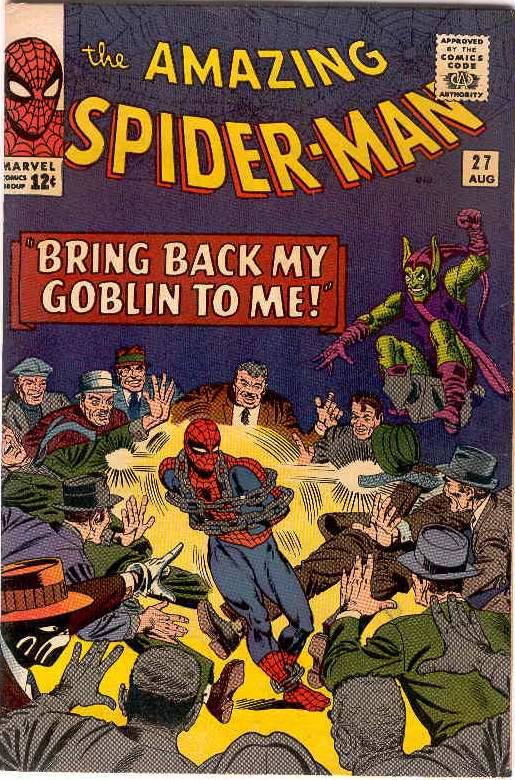
As many fans of Spider-Man comic books well know Spider-Man has an incredibly long history addressing street crime. The early Ditko Spider-Man stories vacillated to parables about science gone too far and crime noir.
Fans of the thus far five Spider-Man films and the more recent pathetic Ultimate Spider-Man cartoon are likely unaware of this long history since it’s essentially devoid in both. Sure Spider-Man might fight regular thugs, but that’s rarely if ever the plot or main thrust of the stories.
But it is in fact from Spider-Man comics that the most famous super villain gangster of all time, the Kingpin, originated. Spider-Man has tangled with Wilson Fisk countless times though admittedly rarely with the same intensity that Daredevil has.
Now sure on film using Kingpin is very unlikely given his affiliation with the Netflix Daredevil series, however Spidey actually has a whole host of other gangster villains with gimmicks which would make them film worthy.
Hammerhead
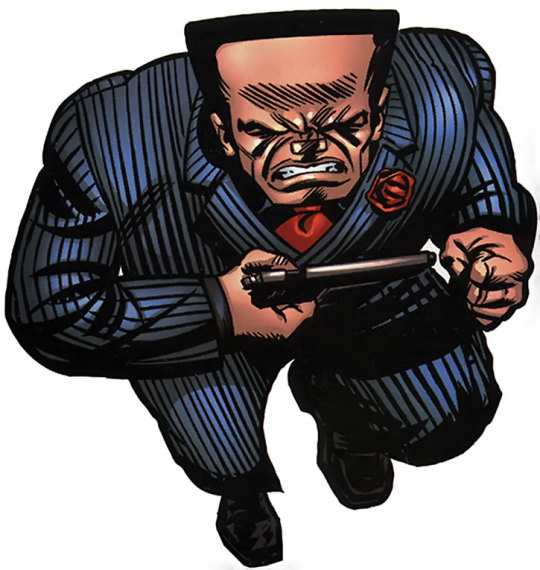
Silvermane
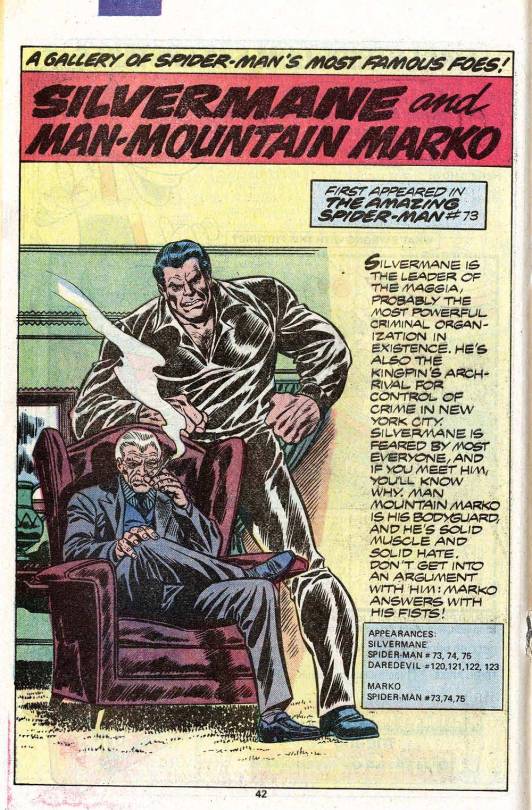
Don Fortunato

Tombstone
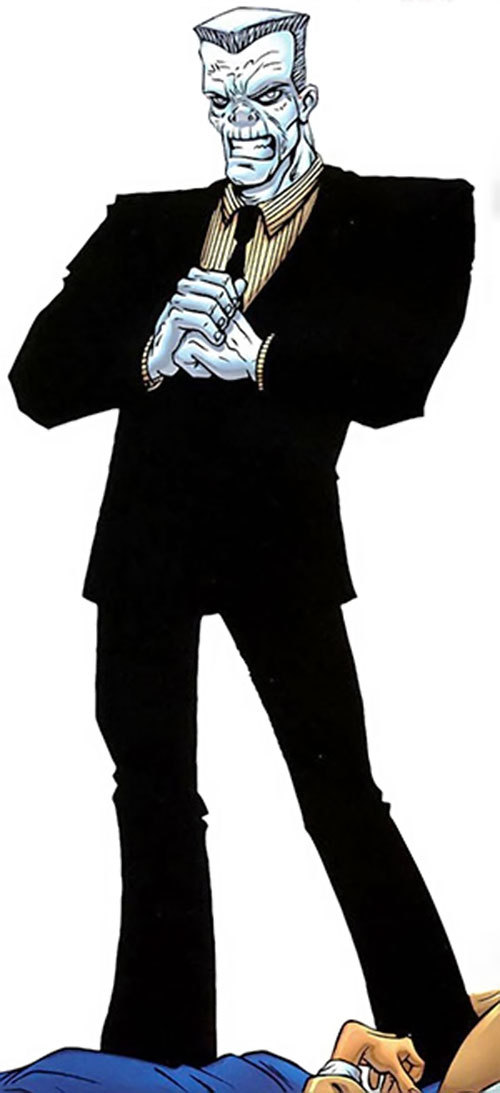
Man Mountain Marko
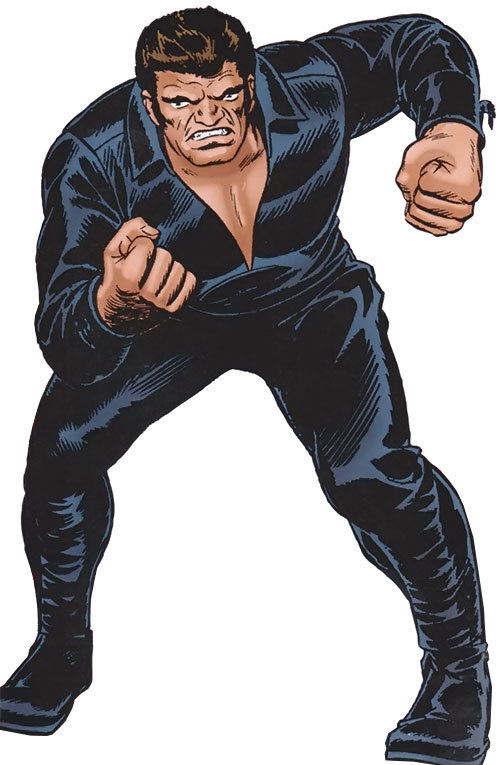
Mister Negative
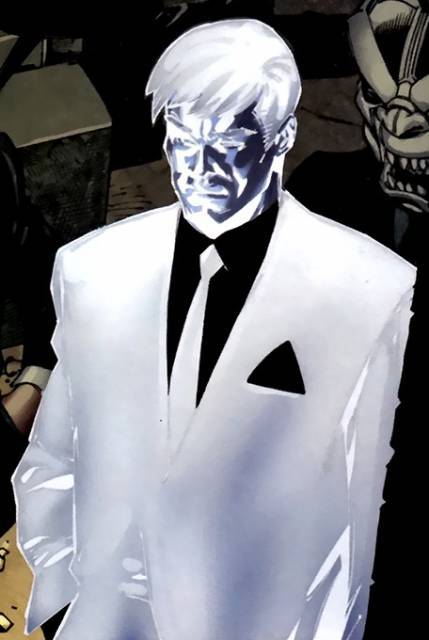
The Rose
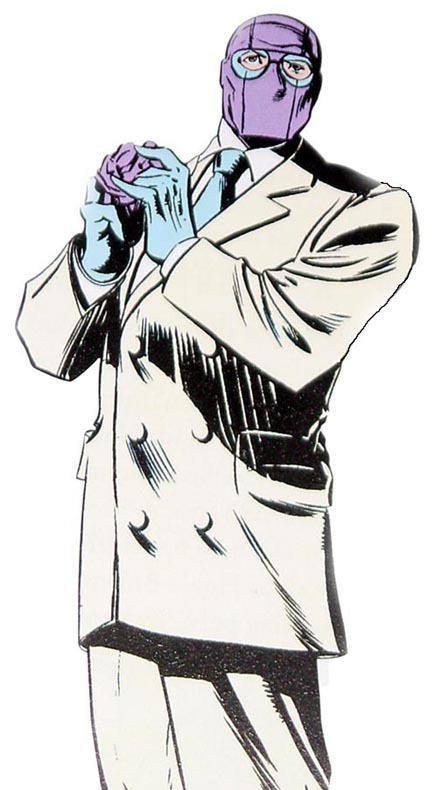
Delilah
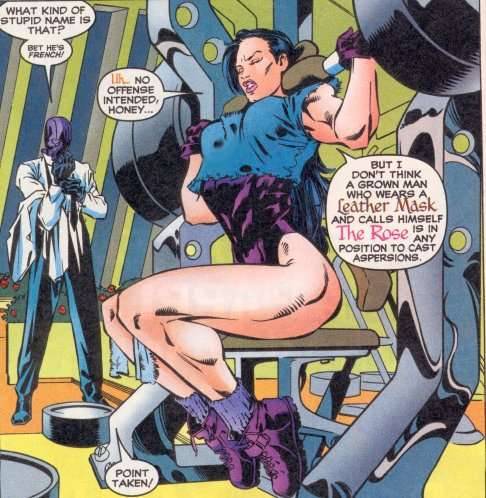
The Crime Master
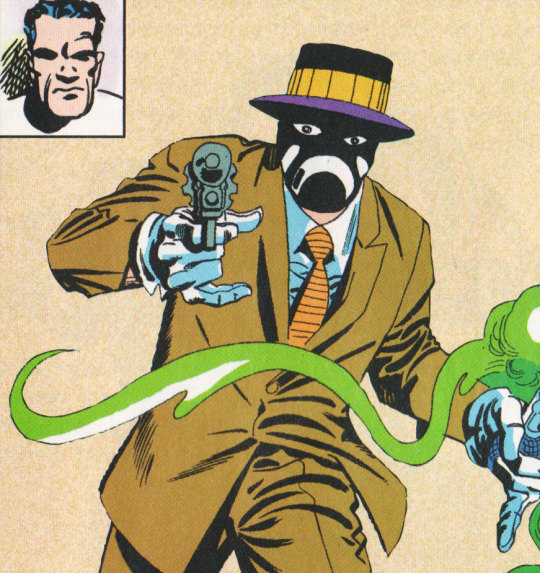
The Big Man

Black Tarantula
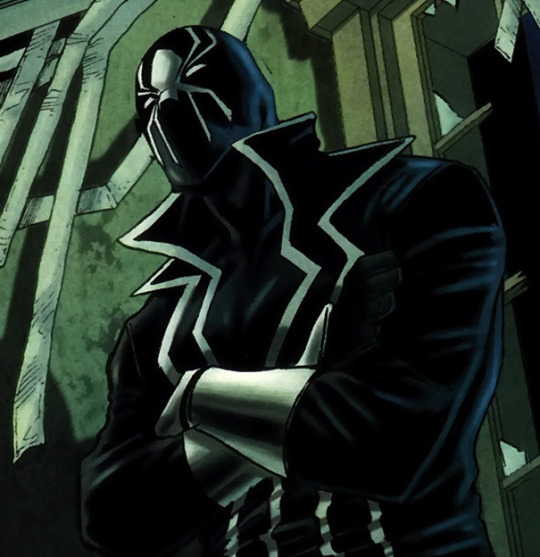
The Enforcers
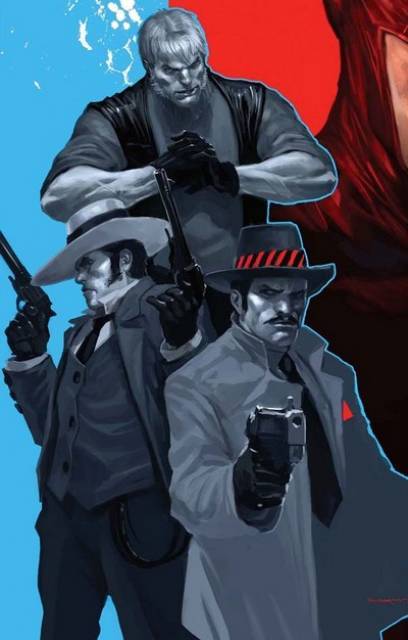
Gangsters one and all.
Gang war storylines have occurred more than once in Spider-Man’s comics and having him caught in the middle of one, trying to end the war for the sake of the civilians would present a realistic, complex and far more difficult to solve challenge for Spider-Man than ever seen before.
Spider-Man could come face to face with the realities of crimes which exist in our own real world and see how it’s not a battle with a true ending but one which he and other people must constantly resist all the same.
Spider-Man and the media
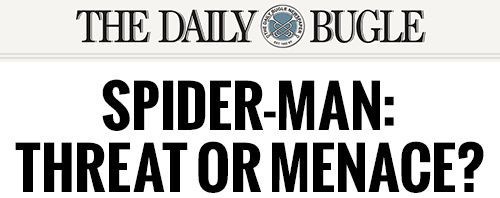
As perfectly cast as J.K. Simmons was as J. Jonah Jameson in the original Sam Raimi Spider-Man film trilogy it must be said the movies downplayed the character compared to the comic books.
Whilst he served the same basic function as Spider-Mans loudmouth skinflint boss who used yellow journalism to slander Spider-Man and make the city mistrust and hate him, he was ultimately a bit player in the proceedings of the trilogy.
In the comic books especially the early days of Spider-Man Jameson was almost the resident villain of the series, a lot of panel time was dedicated to him and his irrational vendetta against our hero. He and Spider-Man often exchanged harsh words and it seemed his persecution of Spidey was unrelenting. He was in fact one of the three most important recurring characters in the whole series during the original Steve Ditko run next to Spidey and Aunt May themselves.
Doing a movie which is actually specifically about Spidey’s relationship with Jameson and making the central focus the ramifications of Jameson’s smear campaign would not only be something original for a Spider-Man film but fairly original for a superhero film in general. Jameson isn’t a super villain nor is he truly evil. He’s just a greedy man with an irrational hatred stemming from deepset issues which themselves make him a compelling character.
The film could thus be about the abuses of power afforded to those who control the media and examine the responsibilities and role the press should hold, with a greater focus being upon the press’ obsession with celebrities and the detrimental effects they can have on their lives.
Once more this isn’t an enemy or a crisis Spider-Man can truly resolve or defeat, so much as learn to live with, which is once again something fairly unique for a superhero movie.
But just so we can have our bam smack pow superhero action we could draw upon one of two classic Spider-Man tales to generate a villain or two.
In Amazing Spider-Man #20 Jameson infamously helps create the Scorpion as a natural adversary to Spider-Man only for his creation to turn on him thus justifying Spider-Man save him. The Scorpion has never been done on film and fits Marvel’s mould of villains who are dark reflections of the hero. In fact that is why Jameson created the Scorpion, he was based upon a fellow (but bigger) arachnid.
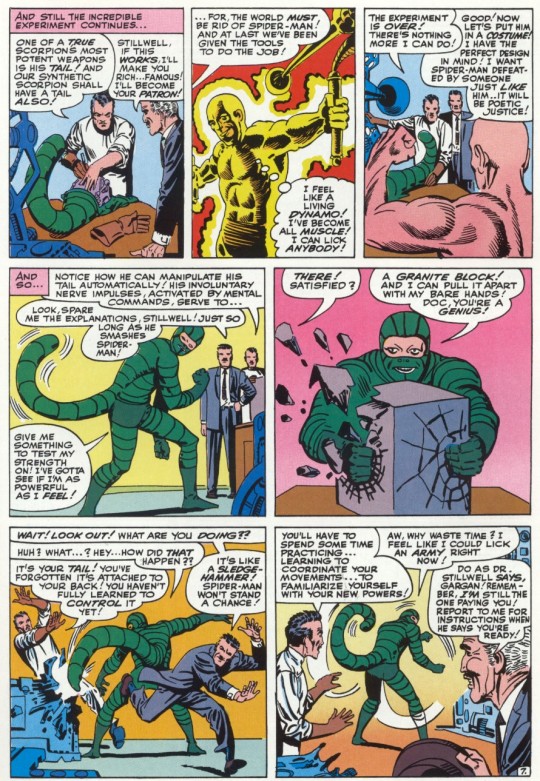
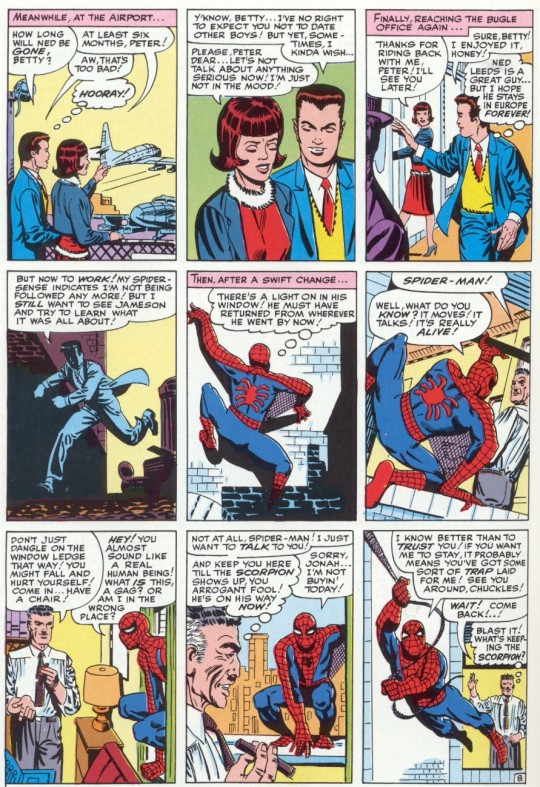
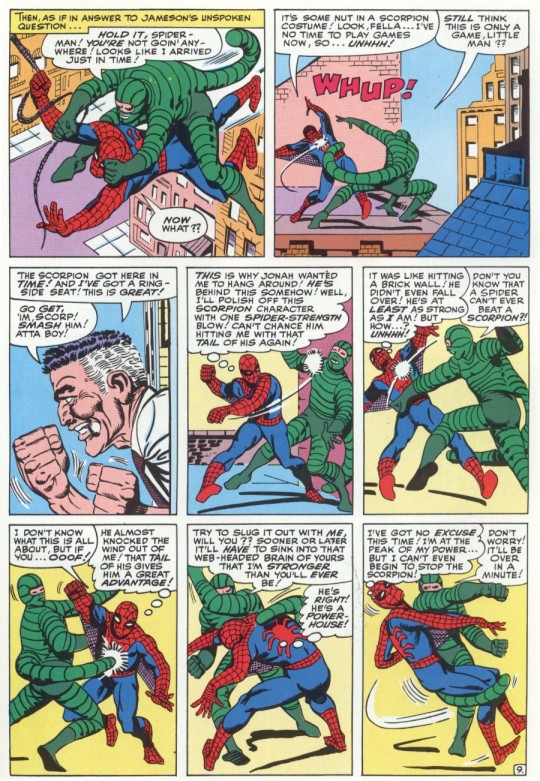
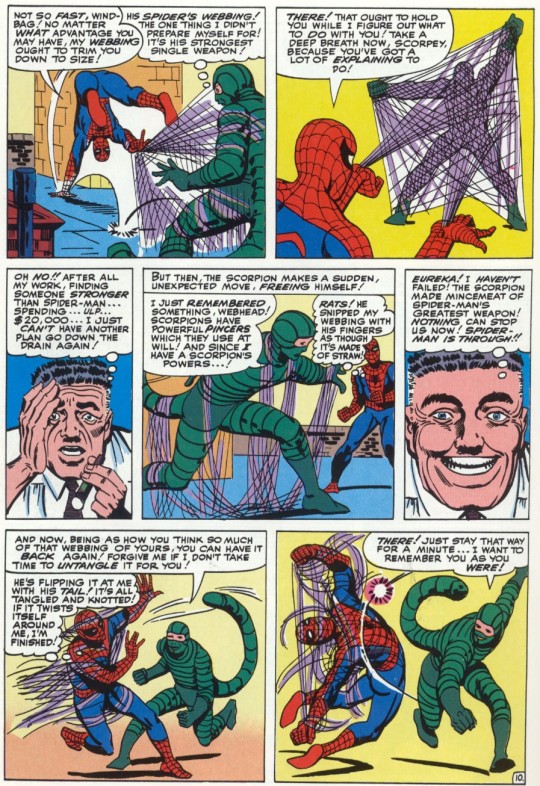
Alternatively we could draw upon a famous recurring element of Spider-Man lore, the Spider Slayers. Throughout his history Spencer Smythe and his son Alistair have created robots specifically designed to locate, capture and sometimes kill Spider-Man, with the designs of the robots offering a variety of interesting visuals. However many of the Spider Slayers were affiliated with Jameson who wanted to use them to rid the world of Spider-Man.
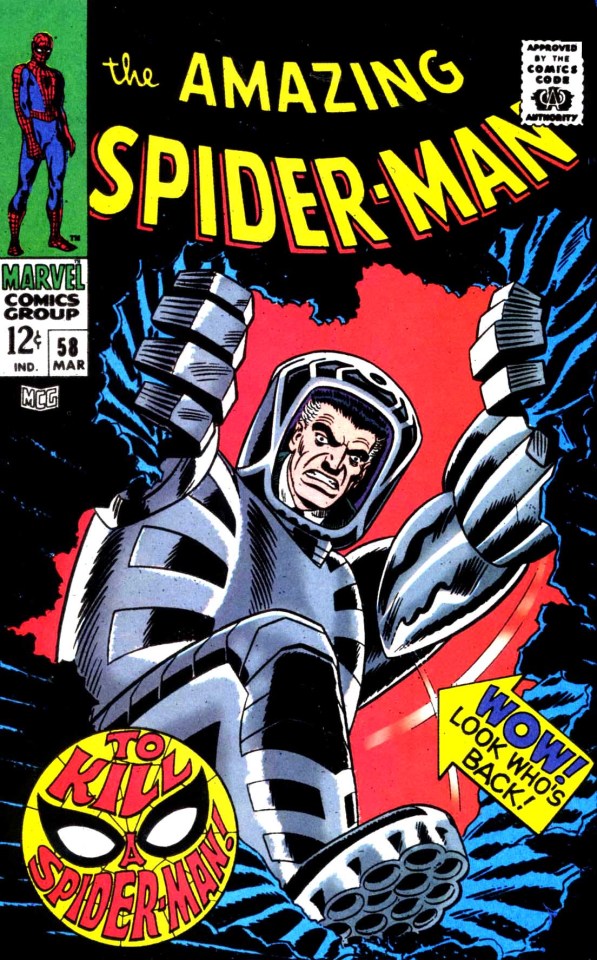
Perhaps one of the most famous Spider Slayer stories was the death of Spencer Smythe which involved Jameson and Spider-Man shackled together by a bomb counting down to their destruction. Adapting this would be a perfect way to bring the movie to it’s climax and focus in on the central relationship between Spider-Man and Jameson.
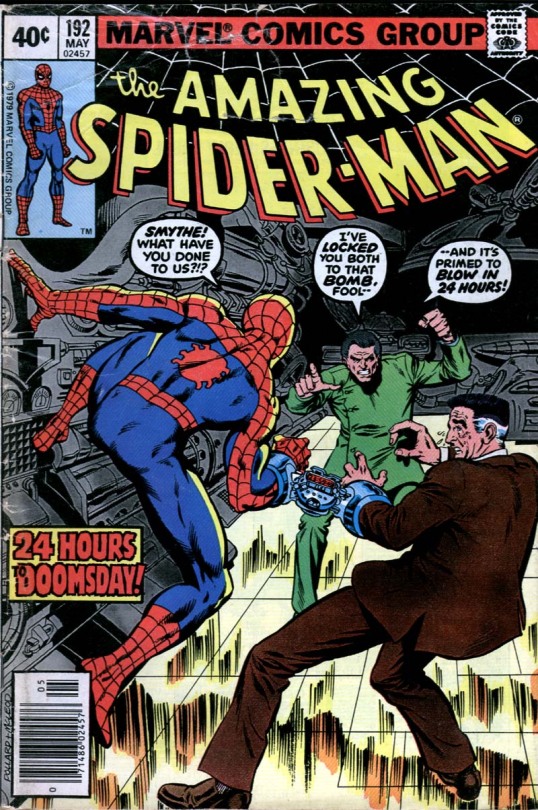
Peter Parker is a Mama’s boy
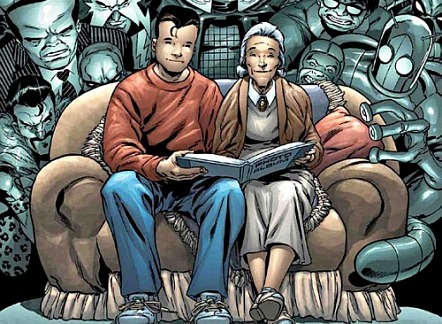
Love her or hate her, Aunt May is vitally important to the mythology of Spider-Man and his character. Hence she’s appeared in every Spider-Man movie to date.
She is also his mother. Not biologically, but in all the ways that really matter she is his mother.
Many stories (sometimes to an exaggerated extent) have showcased Peter’s affection for May and her doting attitude towards him. But like Jameson we’ve only seen this in the movies as part of larger plots where it isn’t really the point. When done right it’s really endearing and something relatable to most people.
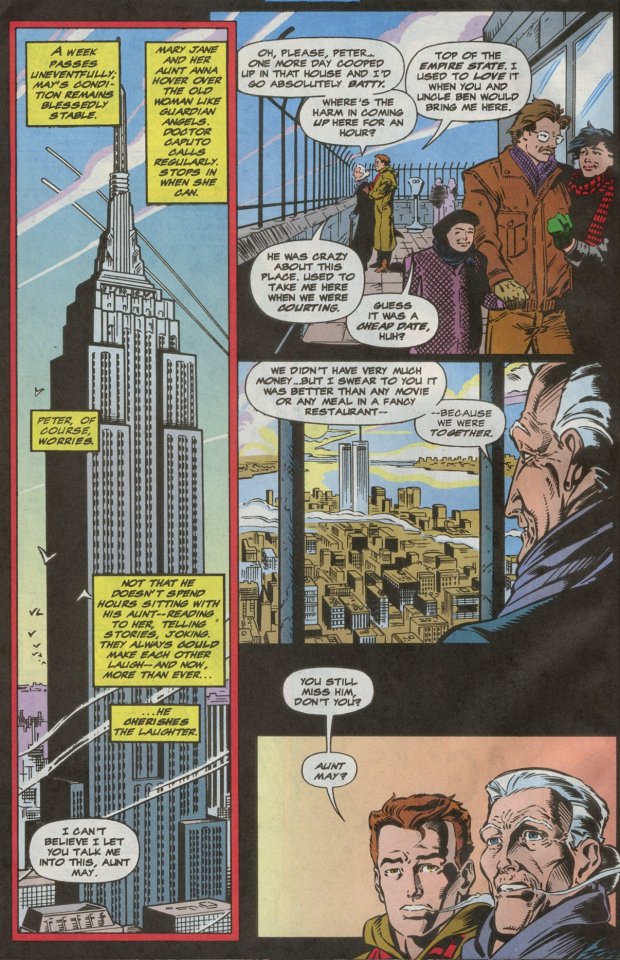
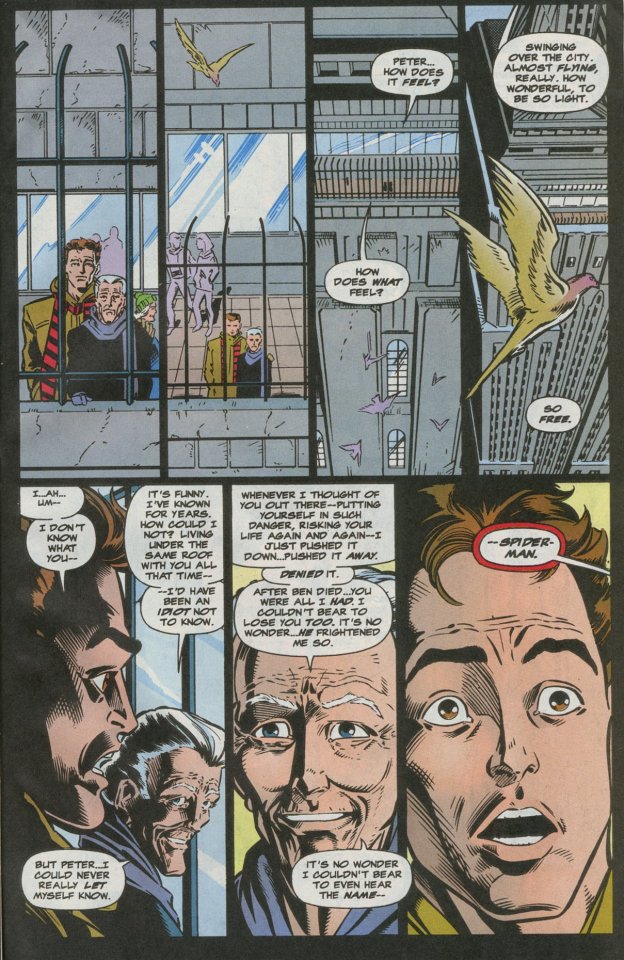
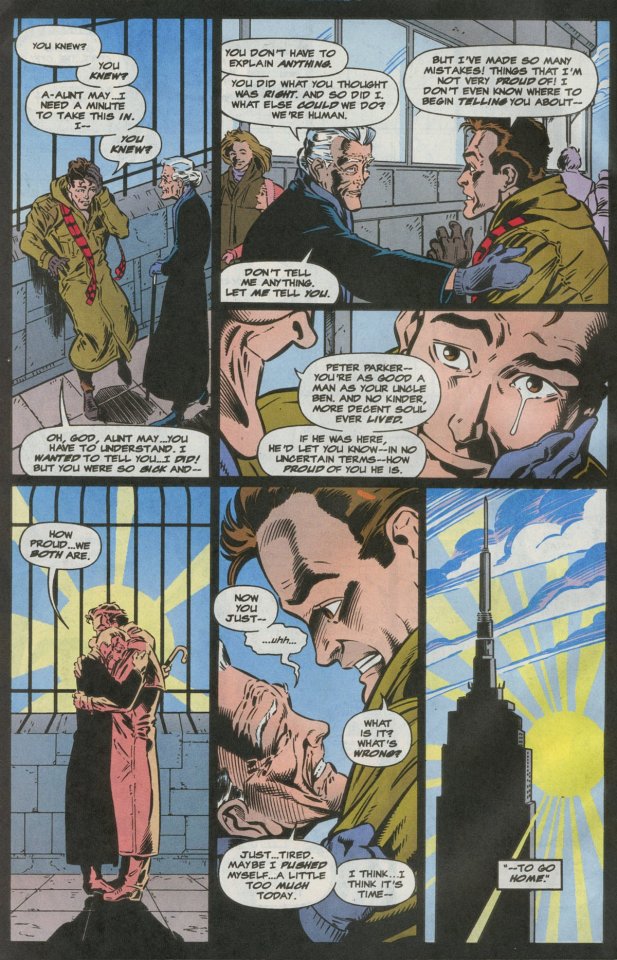
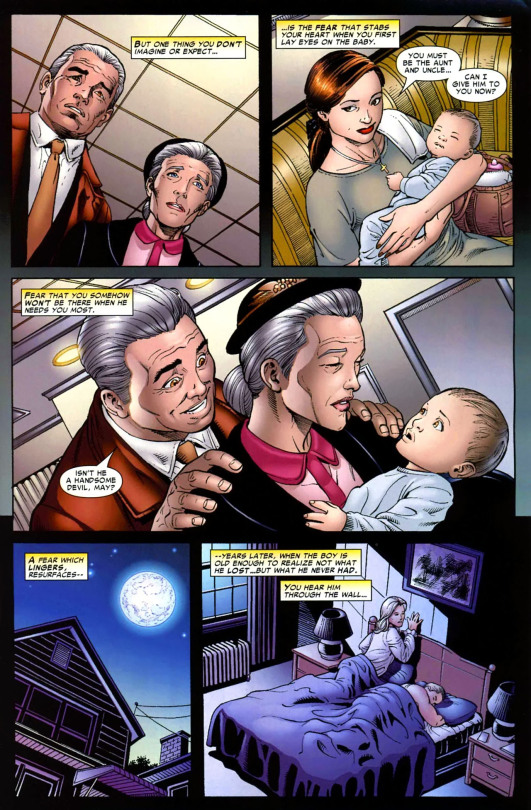
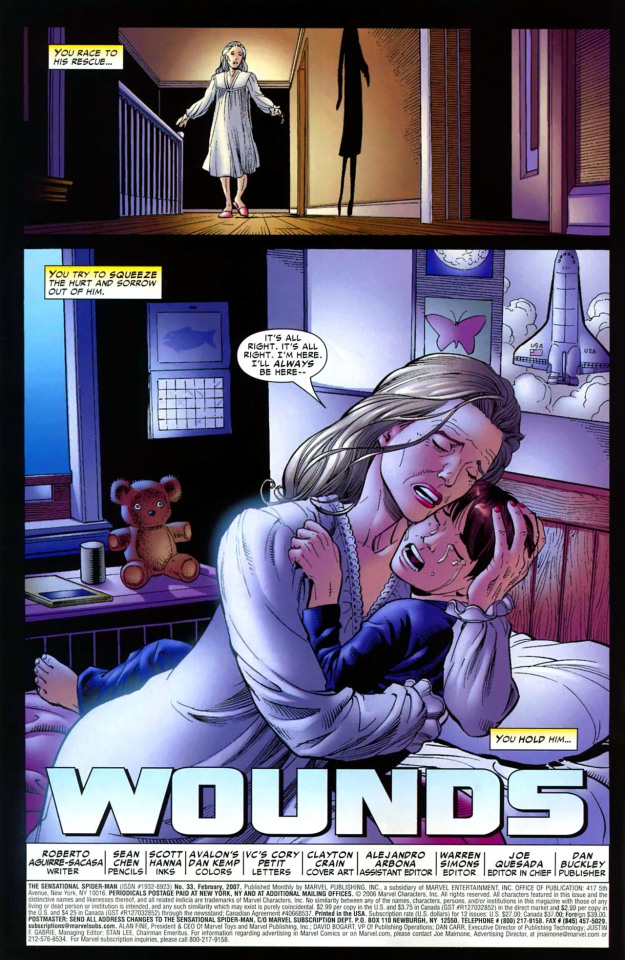
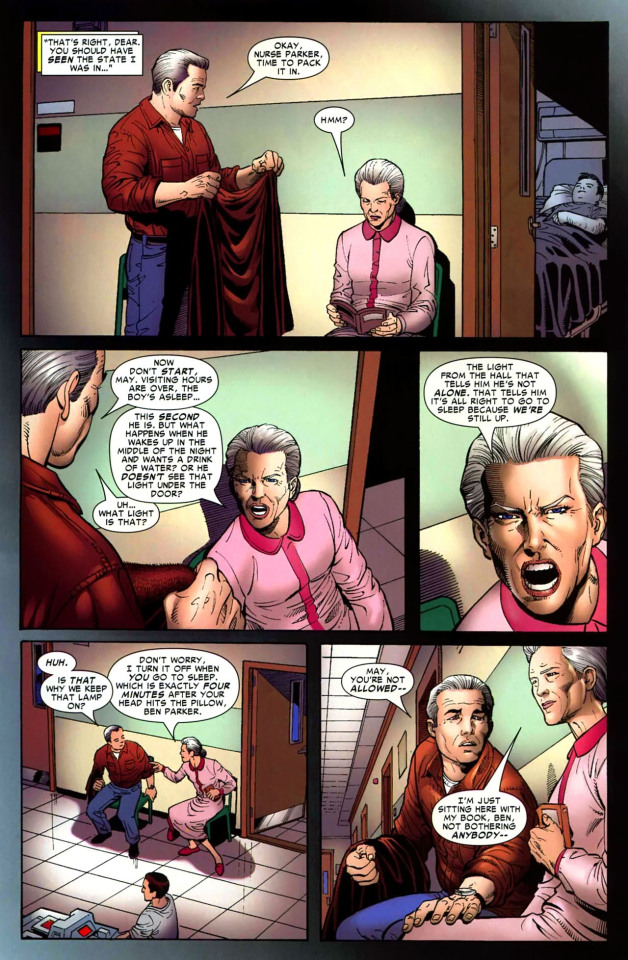
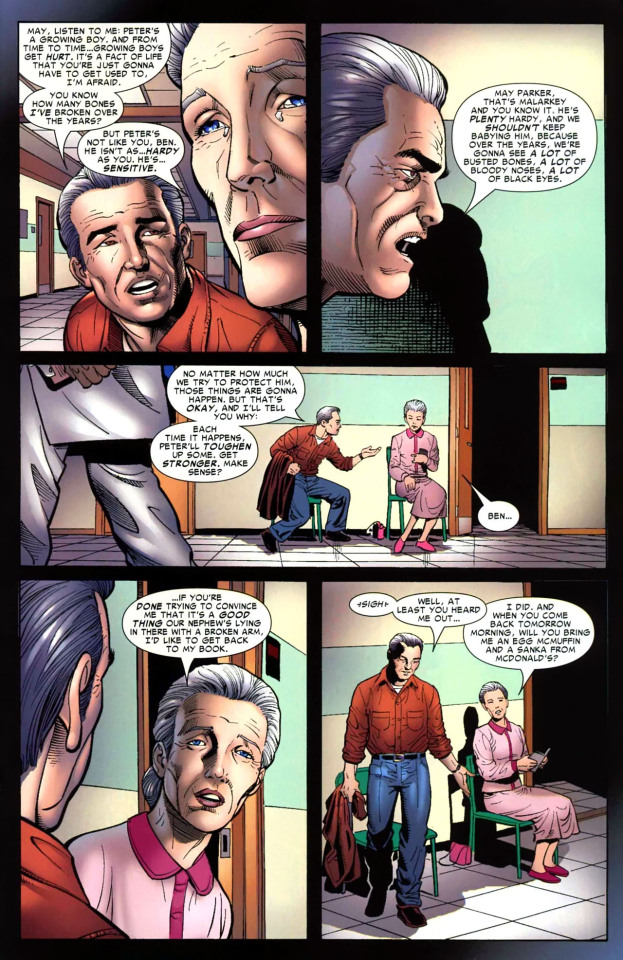
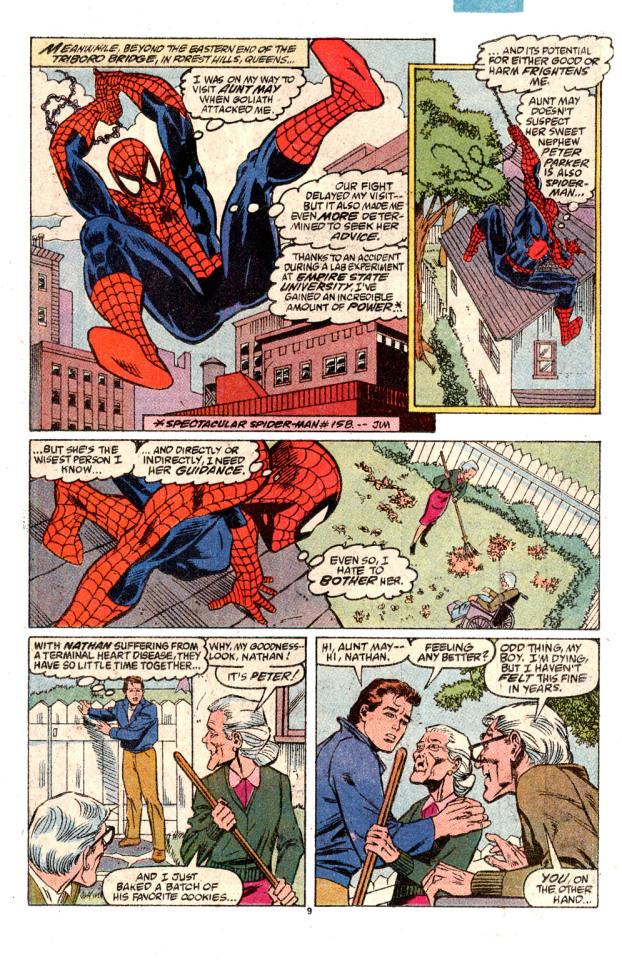
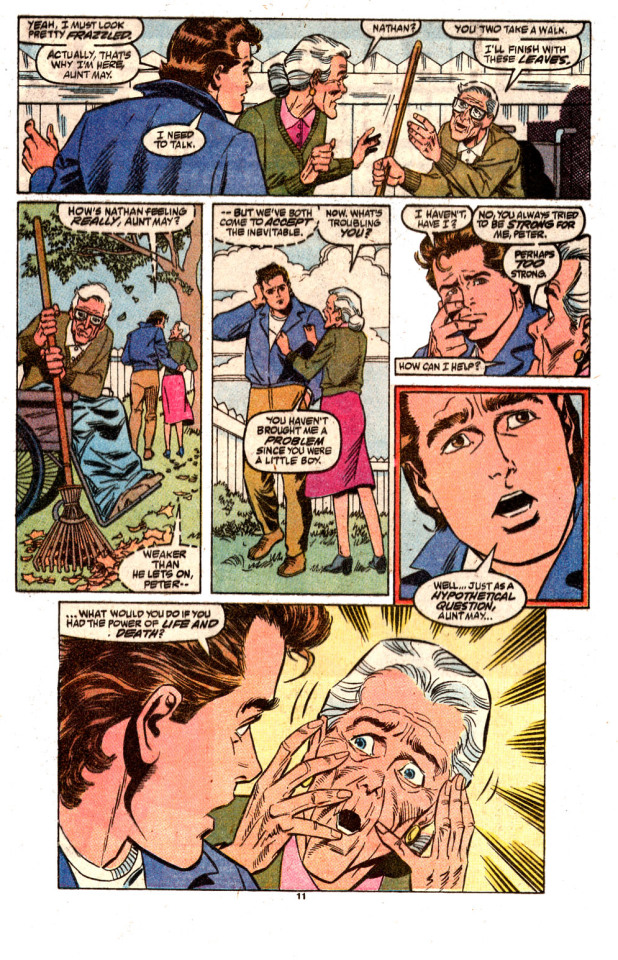
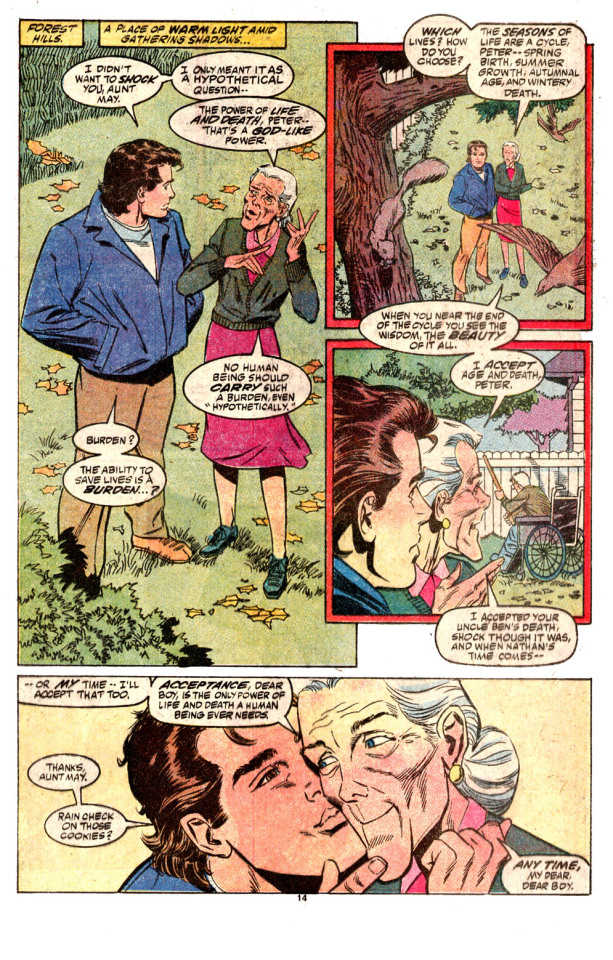
Instead of a Spider-Man movie which is about Peter Parker’s romance with a woman, his rivalry with a new villain, the mystery of his dead parents or (ugh) his teacher/student relationship with someone like Iron Man, why not make the heart and soul of this movie about a parent and child, specifically a mother and her son.
Films like Logan prove that that can work but the unique twist of this movie would be that the focus isn’t upon someone learning to be a parent or a father/son relationship or a mother/daughter relationship or even a father/daughter relationship. Rather it’d be the far less focussed upon mother/son relationship.
Even in movies which do focus upon a relationship like this things typically play out wherein the mother is fridged, or it’s about a woman learning to be a mother, or a woman struggling to survive for the sake of her son or where the relationship is strained (think Tony Soprano and his mother).
Instead this would be a movie about a kid and his mother figure coming to together to cope and survive in a world now bereft of the most important person in both of their lives who supported them both.
And the central basis of this movie could be arguably THE most iconic Spider-Man storyline of all time, the Master Planner trilogy. Allow me to give you some cliffnotes from the story.
A new gang working for a criminal called the Master Planner who plans his schemes meticulously so they go off without a hitch butts heads with Spider-Man. Meanwhile Aunt May is feeling incredibly unwell as Peter Parker goes to his very first day of college. Later she collapses and we learn that she’s dying, poisoned by a blood transfusion Peter gave to her many issues ago. A potential cure can be created from the expensive ISO-36 chemical.
Peter pawns most of his and May’s possessions to buy the chemical but the Master Planner steals it believing it could be of use in his experiments. Spider-Man uses a Daily Bugle journalist to help him get a lead on the whereabouts of the Master Planner and he proceeds to bust up the criminal underworld, desperately seeking information of the MP.
Finally he learns that the MP is in a secret underwater base so Spider-Man has to swim beneath the Hudson river, infiltrate the base, fight off the hordes of armed henchmen and finally confront the Master Planner himself, who is in fact DOCTOR OCOTPUS.
As they fight Spider-Man is trapped under several tons of heavy metal rubble, with water quickly filling the room and the ISO-36 just out of reach. Then in an endlessly homage and utterly iconic scene Spider-Man ruminates upon how he cannot allow himself to fail Aunt May like he did Uncle Ben and gradually summons all of his strength and in a supreme act of willpower throws off all of the rubble in the greatest Spider-Man splash page of all time.
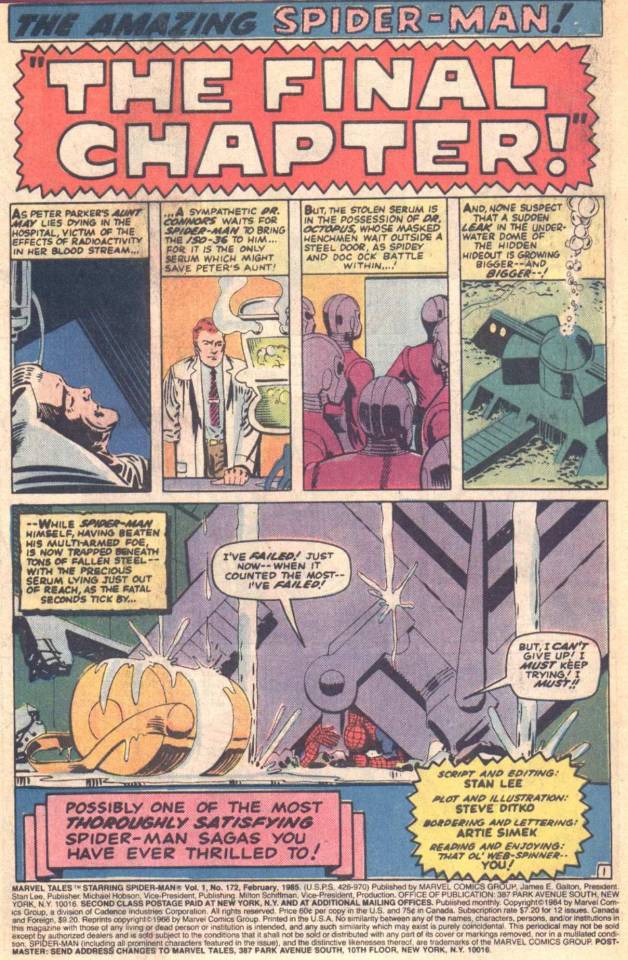
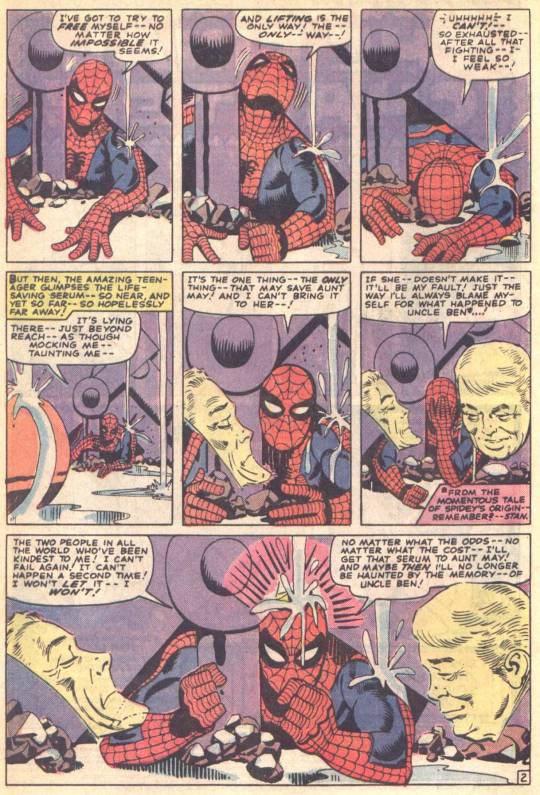
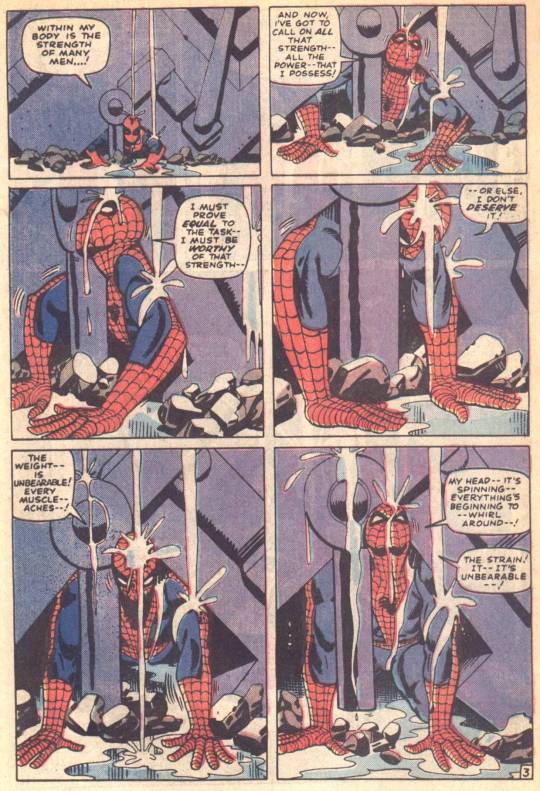
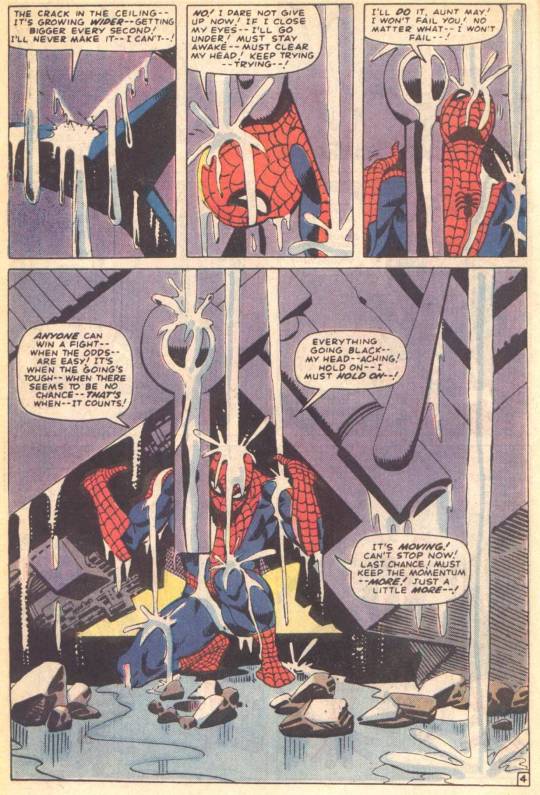
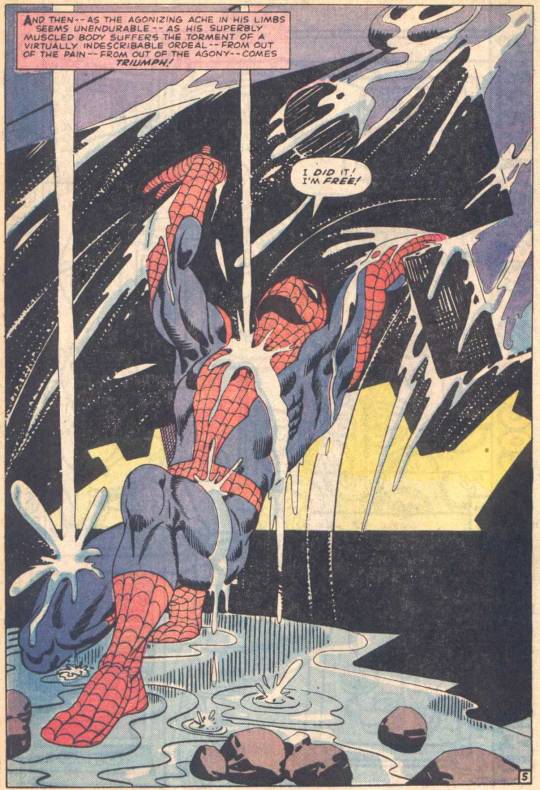
He then gets the ISO-36 swims back to the surface, fights some of Doc Ock’s goons underwater, then despite his exhaustion single handily kicks the rest of their asses before getting the chemical to the doctors just in time to save Aunt May.
Now sure that isn’t everything that happened and you’d have to tweak a few things to make it work as a self-contained movie about a high schooler...but...goddam...how does all that NOT sound like the most baller Spider-Man movie ever!?
There’s action, there’s tension, irony, human drama, heroism; it’s got everything!
Now you see those three idea I just tossed out?
Well with one exception all of them are based upon the original Steve Ditko run of Spider-Man. In fact not even all of the Ditko run, just the first 33 issues.
None of them involve retelling Peter Parker’s origin.
None of them involve repeating material or storylines we’ve seen in other movies before apart from Spider-Man fighting Doctor Octopus which is in my suggestion not even the point of the movie.
I just made all of those suggestions up off the top of my head based upon less than the first five years of Peter Parker’s existence.
I could probably make up even more if I cast my net further and spend a bit more time considering it.
So tell me again how there are no new ideas for a Peter Parker Spider-Man movie?
Tell me how the only way to make the franchise fresh again is to use another character other than Peter Parker?
Go on. I dare ya?
#Peter Parker#Miles Morales#Spider-Man#Ultimate Spider-Man#mcu#marvel cinematic universe#Spider-Man: Homecoming#Marvel#marvel comics#Aunt May#May Parker#J. Jonah Jameson#Scorpion#Mac Gargan#Spencer Smythe#alistair smythe#Kingpin#Hammerhead#Tombstone
31 notes
·
View notes
Text
Assignment - Making a Poster
Research, brainstorming and moodboards
I designed a poster for Chvrches, a synthpop/indie rock band. I started by making a visual collection of band concert posters to get an idea of what’s out there, then listened through Chvrches most recent album a few times and read interviews and articles about the themes and concepts behind the album, song lyrics, and visual content of the band including album artwork, music videos, photo shoots and posters to get a sense of their iconography and visual identity.
I feel like with pop music from the 1950s bands and recording studios have become more aware and intertwined with the art and illustrating worlds and how fruitful this relationship can be commercially and creatively. A strong example that springs to mind is The Beatles and how they used evolving visual language to theme albums and films, signposting new creative eras for the band (Britrock A Hard Day’s Night, more hippy Help era, Sgt. Peppers, Yellow Submarine, stripped back the psychedelics for The White Album and Let it Be). More current bands and pop artists use drastic changes in visual language to signify new phases too - My Chemical Romance in the mid2000s going from general emo vibes to Goth Marching Band to Futuristic Desert Latex Rockers - Taylor Swift’s new music video for the single “Me” where a snake, the symbol from her last visual/musical phase, literally transforms into butterflies, the symbol for her new phase. So I also researched the musical, lyrical and visual thematic timeline of Chvrches through their album covers, music videos and posters to get a sense of their journey.
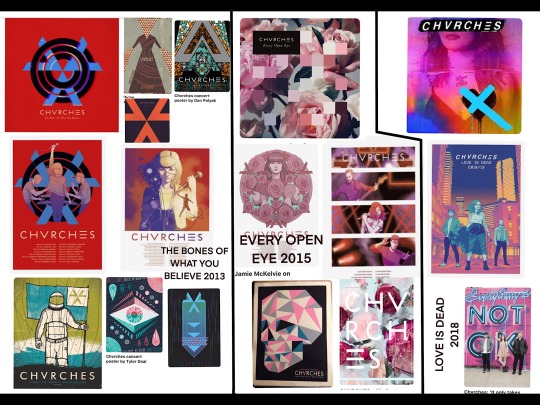
I came up with some ideas that applied more generally, associated with Chvrches across their whole timeline and probably a bit more geared towards their first album, looking at the combination of classical kind of spiritual imagery mixed with science fiction and dystopian themes in their music and lyrics.
Their third album lyrics have a bit of a different focus, more specifically about humanity in conflict with itself or being disenchanted with humanity. The genre of the music is leaning more towards pop and exploring their 80s influences in a different way.
Below - markmaking while listening to “Love is Dead” album, colours inspired by the album cover.

I went through some collections of artwork and inspiration I’ve been building up over time and picked out images that I felt resonated with the themes I’d identified in Chrvches’ music. This moodboard collected ideas I might use for the content of my poster.
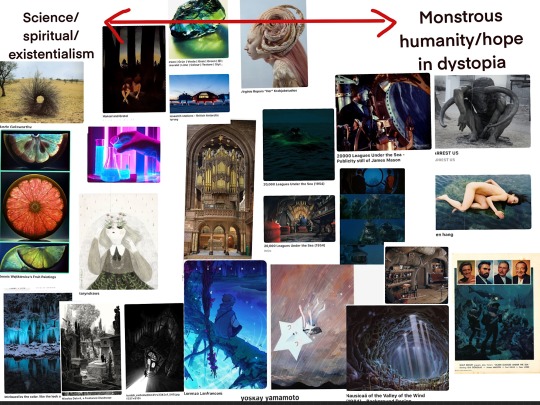
I created another moodboard of artist inspiration and ideas for the style and tone of my poster, which came to mind while I was making the content moodboard. Gustave Doré for his illustrations for The Divine Comedy and Paradise Lost, literature I associate strongly with grappling with humanity and morality and spiritualism. Tove Jansson for her similarly dense linework and exploration of psychological/existential themes in the later Moomin books. I feel like her swirling ink shading really draws you into the emotion of the scene and the character, the environment matching the emotion in pathetic fallacy. Kay Neilsen for his illustrations of classic folk tales, which have a kind of fable-like association for me. Particularly his illustration on a man in a red cloak striking out through the night in snow shoes really struck me with this idea of a quest for humanity, which I felt reflected Chvrches’ theme of searching for light in dark times.
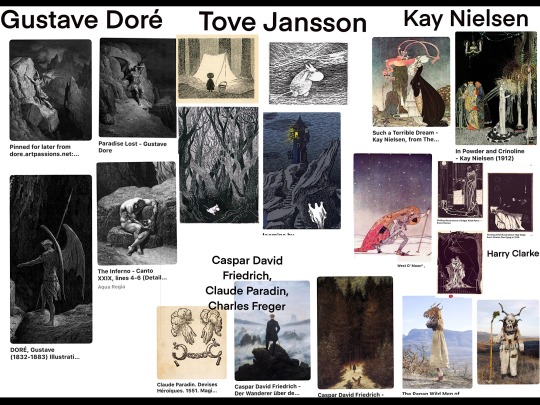
Thumbnails - interactions of elements from content moodboard and style moodboard (labelled A).
I picked these two to develop because I felt they were the most effective in portraying my themes and appealed to me compositionally. In the left thumbnail there’s an minotaur climbing down from ruins into a grotto with a glowing crystal at the bottom with plant life growing around it, fed by it’s light. this was my interpretation of the “quest for redemption/humanity’s worth” theme, with a dystopian scene at the top, then a quest through a dark grotto/labyrinth, then light and life at the bottom, so the image has a beginning, middle and end structure, in keeping with classic fables and folktales. I was inspired by Pedro Requejo Novoa’s minotaur sculpture (which you can see a bit clearer in a moodboard below) and his nuanced and humanising portrayal of an ancient monster from mythology. I liked the idea of having a monster as the protagonist of my design, because when we’re looking for good in humanity we’re looking for good in ourselves too, so it’s his quest for redemption and worth being portrayed.
The thumbnail on the right shows my idea of having some sort of warped, monstrous creature skeleton, like a dinosaur turned dragon, long dead and withered away but protecting a glowing crystal/egg which could still hatch. I was thinking about themes of life in death or from death, like the phoenix myth, and therefore sparks of good in bad (again this idea of finding redemption or worth in warped/monstrous humanity).
Some of my other thumbnails were very inspired by 20,000 Leagues Under the Sea and John Carpenter’s The Thing, the first text being preoccupied with humanity and technology’s potential for good or evil, the latter featuring a lot of body horror, mutations and monstrosities of the human form.
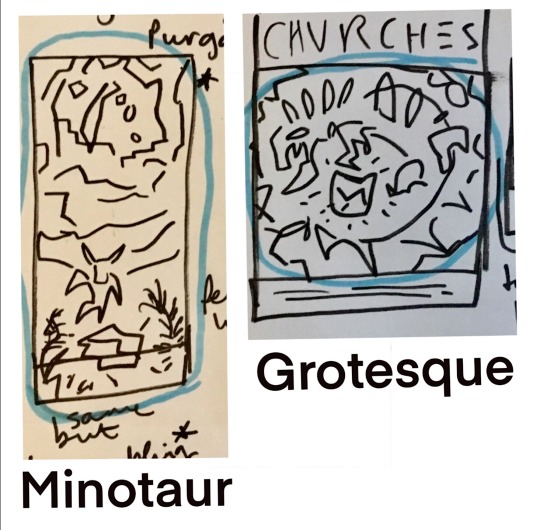
Moodboard below looking at poster design and ways of placing an illustration into a poster format, I also drew some thumbnails to see how my “minotaur” and “grotesque” designs could work as a poster (B).
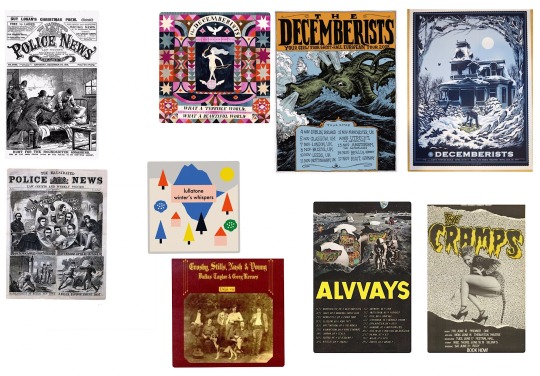
Producing line visuals
Minotaur moodboard - key influences (and refs?)
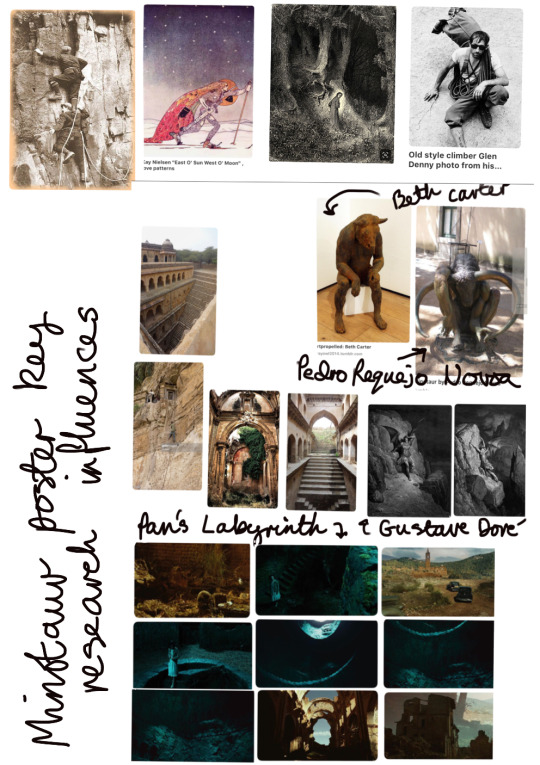
Then minotaur layout process - drawing up and value studies (C)
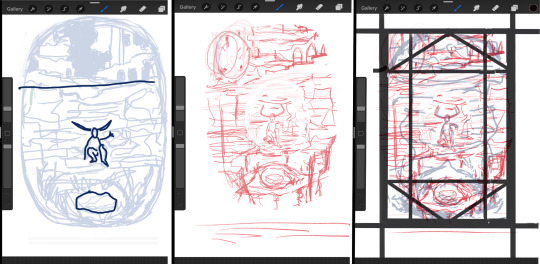
Grotesque key influences - layout
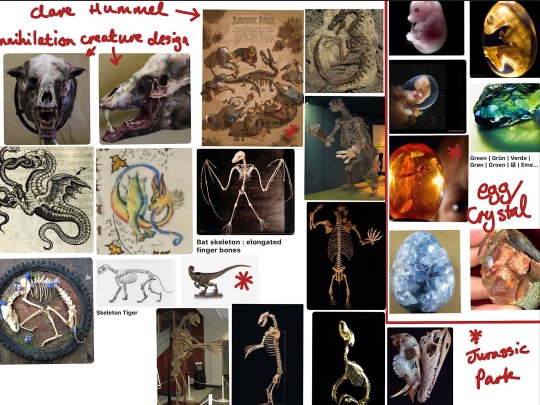
Annihilation film - the creature and production design of this film is incredible. Features an alien process “infecting” an ecosystem and plant, animal and human life, creating beautiful and disturbing amalgamations of the three.
Jurassic Park - the idea of preserved life in a little glowing piece of amber and humanity interfering/disrupting natural life
Medieval quasi-fantastical monster designs, chimeras of different animals
Originally I was planning to draw my creature as a dinosaur/dragon, but I thought my design would imply monstrous humanity if the skeleton I designed had more mammalian than reptilian features, like a shorter, rounder skull. I used references from a tiger, historic cave bear, dog and monkey skeleton, used a kind of bat wing/seal flipper skeletal structure for the hand, then the lower leg, foot and claw is from a velociraptor as a reference to the kitchen scene in Jurassic Park where the velociraptor clicks her claws against the floor.
Layout process (E)
Line visual/Layouts
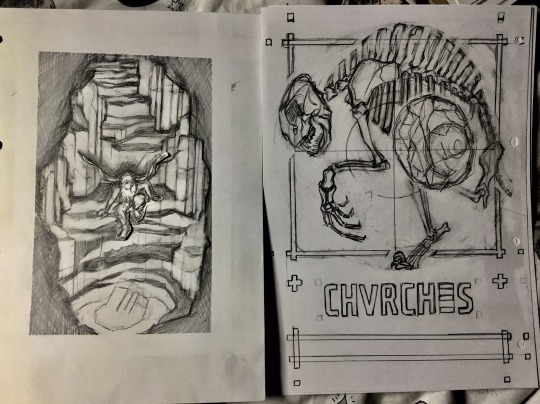
I picked my “grotesque” line visual to work up into a rendered piece. I had designed it as a poster from the start, whereas with the “minotaur” design I still had to figure out formatting, text placement etc. I also felt a lot more confident drawing a skeleton and crystal egg rather than a whole grotto scene with depth and perspective and trying to make the character look like they’re interacting with the environment, this is a bit technically beyond me at the moment so it just didn’t look as convincing as the skeleton design. There’s a lot to be said for simpler elements arranged and drawn more sophisticatedly instead of attempting something really complicated and not quite pulling it off.
Colour and rendering key influences/ideas

I went back to my earlier research on Chvrches’ graphic design and looked at Jamie McElvie’s posters created over the course of the band’s career. I liked the idea of trying to make my fit in with their band aesthetic, and noted down some key visual elements that were present in his latest poster and the band’s latest album cover:
- clean line art, flat blocks of colour with cell shading
- neon bright bold colours but a little muted, some more muddy tones like in bottom right corner of album design (this combination also present in these artist posters for Annihilation)
- mostly warm tones of pink, red, orange, yellow, contrasted with blue and green pops
Below I tried two different types of line art, the first is more my regular style, using my favourite brush pen and keeping things spontaneous and a bit messy, thick lines. With the second I tried s style inspired by Jamie McElvie’s - geometric, thin lines, clean and sharp. I used this second style for my poster.
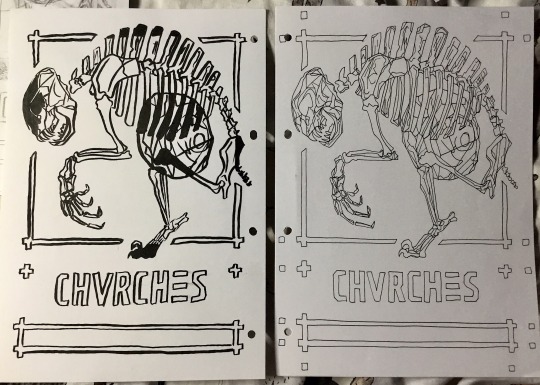
Colour/background colour experiments
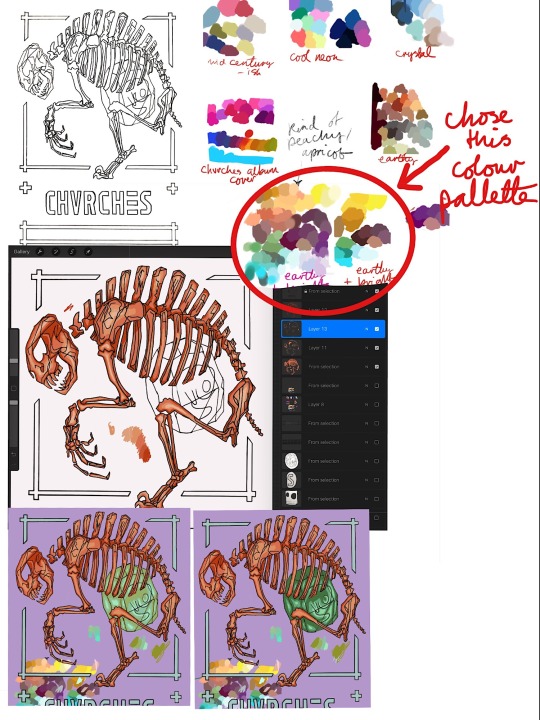
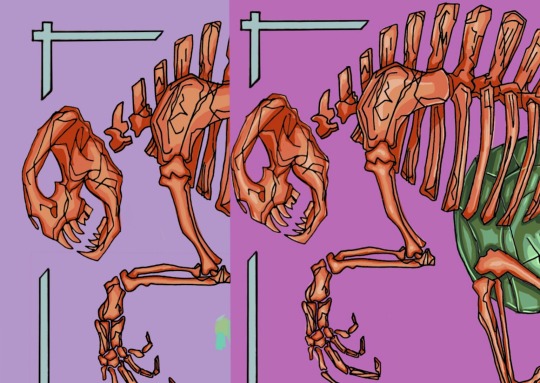
Trying different amounts of cell shading layers. I’m still not sure whether I prefer the left or the right, the extra highlight on the right adds this eye-catching pop, but having just three layers on the left might be stronger for its simplicity.
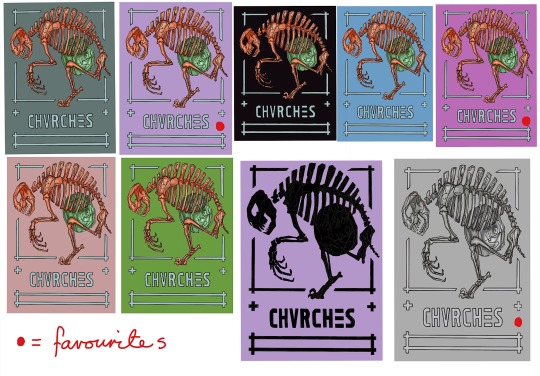
Outcomes
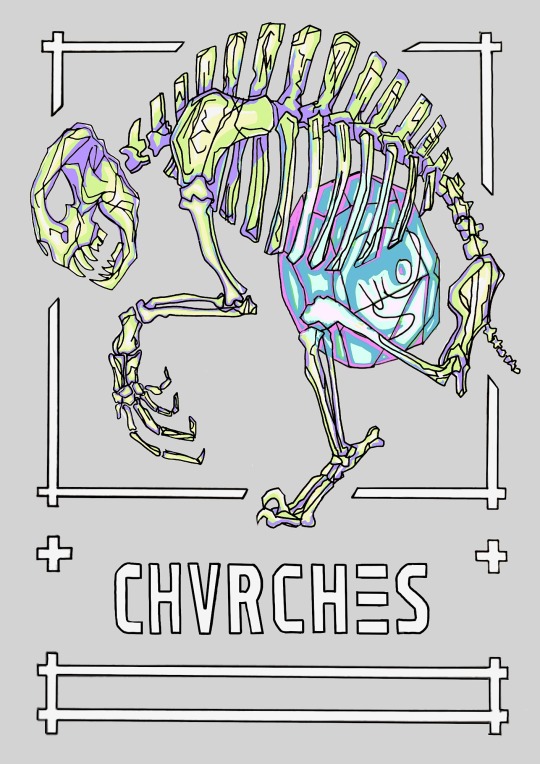
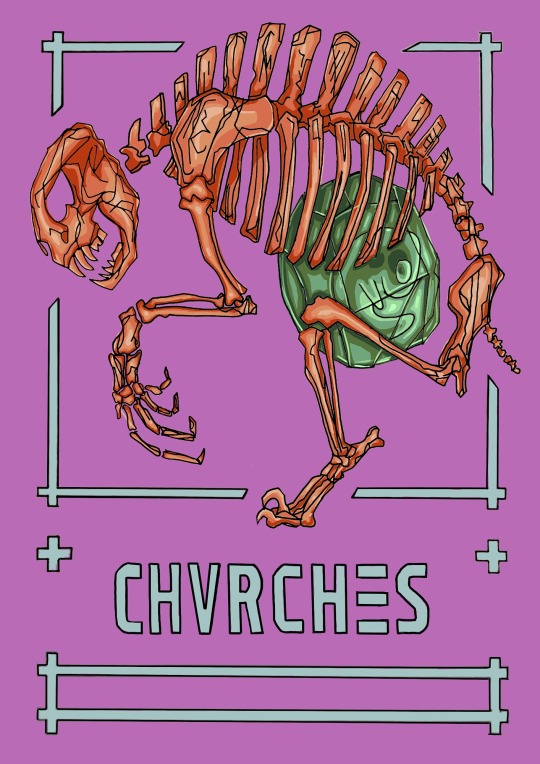
0 notes
Text
Scientists or Politicians: Who to Believe?
Today, my friend, who also considers herself an environmentalist, sent me a screenshot of a tweet which President Trump sent out last night. It read, “In the beautiful Midwest, windchill temperatures are reaching minus 60 degrees, the coldest ever recorded. In coming days, expected to get even colder. People can’t last outside even for minutes. What the hell is going on with Global Warming? Please come back fast, we need you!” Of course I replied something along the lines of “How can he be so dumb????” This is not the first time I have seen Trump blatantly show that he is a leader who seriously does not care about and/or understand the severity and actual phenomenon of climate change. Perhaps these ignorant tweets and comments which we have heard again and again from Mr. Trump are fueled by some hidden political agenda- I do believe they are in part that. However, in 2019 even the sheer possibility that we could have a president who denies climate change is unacceptable and frankly pathetic. Actually having a president who could care less about the plight of our environment is just plain scary.
Our country’s current leadership displays exactly how critical an understanding of science- specifically environmental science- is for the masses and most especially for those who are in power. If, in an alternate universe, President Trump had taken an environmental science course, imagine how different the United States’ position would be in regards to the environment and climate change. I would guess that we would have some vastly different policy than what we are seeing today; perhaps further environmental protection and regulation policy, rather than roll backs on already too weak environmental policy for our station. This would be the case, I believe, if our leaders understood science and environmental processes. This lack of scientific knowledge among our leaders is a serious problem which needs addressing. We as citizens first have a duty to educate ourselves on environmental issues, but this week we will focus on how politicians can take a play from scientists’ book.
If politicians used the same method which scientists use to answer questions about how nature works, their policy making process would certainly be streamlined. Scientists go through some variation of this multi-step process known as the scientific method. First, they identify a problem. Next, they find out what is known about the problem, ask a question to investigate this problem, and then collect data to answer this question. After this, they will propose a hypothesis to explain the data collected, make testable projections and test these projections with further experiments. Finally, they accept or reject the hypothesis. The steps of this method are the building blocks to how scientists come to conclusions; however, even after conclusions have been made, they continue to be curious and skeptical and constantly demand a lot of evidence (Miller 34). This is very important to be noted, as this thorough process solidifies the authority of scientists on climate change: an intrinsically scientific issue which is agreed upon by the vast majority of scientists.

Scientific consensus on climate change. Illustration: John Cook
Of course, everything is to be taken with a grain of salt and scientists have realized this and practice just that. We can learn from scientists to be skeptical about everything we read or hear. In the age of “Fake News”, we have to be especially careful with what we allow ourselves to accept as fact and fiction. Many Americans, I am sure, have subscribed to Trump’s false narrative on climate change. However, more Americans every year are siding with scientists who have developed their conclusions based on the scientific method which I just explained. Who do you think is more trustworthy in the scientific arena- a business man turned politician without any scientific background, or professionals who study and research science for a living. Need I say more?
Scientists take seriously the theories which they produce, rather than politicians who oftentimes change their standings with the tide. Scientific theories have been tested widely and are supported by extensive evidence. They are, therefore, not to be taken lightly and are only overturned if significant evidence is found to discredit it. It is to be noted, nonetheless that science does have its limitations. Nothing in science can be proven or disproven absolutely. For this reason, scientists are discouraged from using the word proofas it implies “definite proof”. Scientists can only establish a finite percent of certainty: more than 90 percent indicates high probability (Miller 35).
One key component of any area of science is energy, defined as “the capacity to do work or to transfer heat” (Miller 44). Energy is the driving force of our natural world, and without it life as we know it could not be possible. Almost all of the energy which heats the earth and our buildings, and supports plant life and as a result our food and the food of other organisms is coming from the sun. This natural reality is in line with the principle of sustainability, which I described in one of my earlier blog posts. The suns energy also drives many other sustainable forms of energy which we employ: wind, hydropower and biomass are all results of the sun’s heat. The sun gives us 99% of our energy on Earth (Miller 45). The last 1% of our energy comes mostly from fossil fuels such as coal, oil and natural gases (Miller 45). These forms of energy are nonrenewable. Despite this, our modern society and technology now relies almost predominantly on fossil fuels for energy. Oil, coal and natural gases are not only unsustainable because there is a limited amount of these resources available to us, but also because these forms of energy emit high levels of carbon dioxide into the atmosphere. This spike in carbon dioxide and other greenhouse gases have been the deciding factor in the Earth’s rising temperatures and resulting climate change.
This scientific theory, known as the greenhouse effect, is agreed to be highly certain by the vast majority of scientists. The greenhouse effect should be dictating not only how we as individuals choose to live our daily lives, but also how governments and businesses come to decisions on how to run. If the federal government took the conclusions of scientists seriously, perhaps we would have the ability to save our planet from any further damage. Businesses could also make a difference in how they market their goods and what types of materials and energies they choose to purchase and utilize.
Another scientific phenomenon that should be noted here is the conservation of matter. This states that matter cannot be created or destroyed. When we think about how much waste we are creating, this law is essential to remember. Not a single Starbucks cup or plastic bag which we toss is ever really thrown out. Reusable coffee cups, utensils and straws all readily available and should be used instead of one use plastics.
I feel as though I have come to a similar conclusion in all three of my blog posts thus far: we as individuals must start and/or continue to make sustainable and environmentally conscious decisions again and again and again. Change cannot happen overnight, but it is made through a series of bricks creating a wall of sustainability in our lives through our choices. Educating ourselves in actual science rather than the whims of ignorant politicians is a commendable starting point.
https://twitter.com/nowthisnews/status/1102909876836147201?s=12
Check this short video out if you want to see just how ignorant some of our elected representatives are. Viewer discretion advised…pretty painful to watch.
Word Count: 1291
Works Cited
Miller, G. Tyler, Spoolman. Living in the Environment 17th Edition. Scott Cengage Advantage Books, 2011.
0 notes
Text
Shadowhunters is Finally Getting Good: A Writer’s Perspective
This is going to get long, so basically this is where I’m going:
1. Shadowhunters is still finding itself, similar to how Buffy the Vampire Slayer kinda sucked until it grabbed onto its “Monsters as Life Metaphors” structure halfway through Season 2.
2. Because The Mortal Instruments series is such a catastrophic narrative failure, Shadowhunters doesn’t have compelling plot points to string their own original story between, the way True Blood was able to do with their own sub-par source material.
3. The strong character writing is just starting to free the show from the restrictions of its source material.
Where We Are Now
-The company that owns the rights to The Mortal Instruments is using Shadowhunters to return on a damaged investment. They bought the rights to a popular book series, and made a movie that bombed so hard that when the numbers came in, they stopped production on the sequel within weeks. They lost a shit ton of money on what should have been a good investment, and were unwilling to throw too much good money after bad, which is why there wasn’t much investment in the first season. The first season’s low budget affects more than the special effects. It plays into who they can hire, how long they have to rehearse, how long they have to shoot, every element of production.
-The source material is shit, and it’s an albatross around the show’s neck. The movie sucked so hard because it was a pretty faithful adaption of the books, which are torturously long, and full of one note characters who only exist to spout faux-clever dialogue, or facilitate CC’s incest fantasies. They are driven by entirely by plot, not character, which makes for flat fiction.
-The first season had to be, to an extent, experimental. They had to figure out the right mix between what they had to keep to engage book fans, and what they had to add to make it possible for it to be a TV show, because the book doesn’t have enough material to be a couple seasons of TV.
-The first season worked to clear the very low bar of of being less racist, tokenist, slut-shaming, girl-hating, bi-phobic, and all around disgusting than the books.
They succeeded.
Yay.
-Successfully moving past the tragedy of the movie into an expanded episode order and expanded budget mean that season two is essentially a brand new show.
- That season is trying to fight its way free of what it had to be in the first season, and the failure of the movie, and the ball and chain of the books.
The Problems
1. The Show Has Turned Every Pointless, Cardboard Dialogue Spouter from the Books into a Compelling, Nuanced Character, and Now There Are Too Many
The book characters have interesting things on their character sheets, but never become interesting. The show has recomposited characters out of the character elements used in the books, and created complex, compelling, nuanced characters, who have ties and relationships to eachother, who are impacted by the world around them, and who make decisions and affect the world around them and eachother, instead of just waiting around for Clary to discover her special rune magic, or for Magnus to portal them somewhere.
Unfortunately, a bunch of cardboard cutouts creating obstacles to, and eventually enabling brother-sister fucking don’t suck up too much plot time, but 11 suddenly worth-while characters (Clary, Simon, Alec, Isabelle, Jace, Maryse, Jocelyn, Luke, Raphael, Maia, Magnus) plus a few new additions we are invested in to some degree (Lydia, Aldertree, Iris), and a few random additions that don’t seem to do much but create more dialogue and scoot plots along (Valentine, Meliorn, Raj, Max, Dot, Gretel, Suspiciously Important Girl With Glasses) all end up battling for screen time, to the detriment of each other.
For every charming interaction between Maia and Simon, we don’t get to see Luke dealing with Jocelyn’s death. When we get a glimpse into the tenderness of Magnus and Raphael’s relationship, there’s less time to see Magnus and Alec learn where they cross and divide. When we see that Alec and Maryse still love each other, even if the have so much shit left to work through , that takes potential minutes away from someone trying to talk to Jace about being abducted and tortured. There is so much potential, and it’s not possible to turn all of it into plot when there are only 45 minutes a week to work with.
1A. Except Valentine, Who is A Spectacularly Shitty Villain
Valentine is one long HHHHHHHZZZZZZMMMMMMMHHHHHhhzzzzmmmmhhhh on an evil kazoo.
A good villain is the hero of their own story, but they have to be more than that. A good villain has to taunt you with the possibility that they could be the hero of your story. They have to want something in a way that you can understand the wanting, even if what they want isn’t something you would want.
Kylo Ren is a good villain. He wants to be a super powerful Jedi and big deal leader in the Empire and the movie shows you that he wants that because he’s actually a pathetic little snot streak, drowning in his inability to live up to the standards of toxic masculinity around him, while wearing a silly helmet. The desire makes sense.
Spider-Man Villains are good villains. They are typically super smart scientists trying to solve a problem, but their science gives them some sort of mutation that casts them out of the society they were trying to improve.
Magneto is a great villain. A holocaust survivor who believes he sees the writing on the wall and won’t let history repeat itself.
(Quick fact about Oncethrown: I went to go see the Johnny Depp version of Sweeny Todd in theaters in college and didn’t realize he was the villain until the very last scene. (The last last scene. Even after he throws Mrs. Lovett in the oven) Because he was unfairly jailed by a man who wanted him gone so that he could rape Sweeny todd’s wife to be raped into insanity and leave her out on the street to rot, and I was totally onboard with the quest for vengeance up until the moment the blood started pouring out if his neck.)
Valentine is just generically evil. He was born into the most powerful class in his world, was annoyed that his society wouldn’t let him become even more powerful, and now is experimenting on a class he already could kill with little to no repercussions, and working to eradicate them… because he can?
He doesn’t love or care about anyone either. There’s nothing to hold onto about Valentine. He’s just an opposing force. He could be a block of wood with angry eyebrows and the effect on the plot would be about the same.
1B. Except Aldertree, Who We Were Promised Would Be And Interesting Villain is Just A Random Force For Bad.
Aldertree came in to bring the erratic New York Institute back under Clave control. And he started out doing that. He threw the downworlders out of the Institute, he left Jace to rot in jail because he wouldn’t swear total fealty to the Clave, he nearly let Alec die because he threatened very important Shadowhunter traditions by refusing to marry a suitable woman in order to date a man, and a downworlder.
The yin-fen plot line originally was in this same functional but boring vein, until the last episode (spoilers) where he was clearly trying to get Izzy to trade sex for drugs (end spoilers). Generic Rapist Evil not interesting either. All he ended up doing was giving Alec a “Reclaiming the Institute Plotline” which would have been a really, really good piece in that whole “Effects of Institutionalizing Discrimination” theme… if any time had been devoted to it at all this season. Like… Alec originally ceded his authority to Lydia. The way he came for Aldertree just wasn’t given the building blocks to be satisfying.
2. The Books Didn’t Have Layers, and the Show is Trying to Graft an Interesting Theme Onto the Book’s Pocked and Diseased Foundation
The books are just an excuse for incest. The show is attempting to develop a narrative about institutionalized discrimination and oppression, and how characters are influenced by the way that affects their societies, upbringings, relationships and lives.
There is a really underdeveloped attempt at this in the books which more or less boils down to “Shadowhunters are mean to downworlders, and it’s not totally fair, but they are still the heroes, because they are all described as sexually attractive.”
The show is running into a lot of complications as they try to smoosh this theme onto the source material they have to work with.
-The main plot of “Evil McEvil is a Racist Who Wants To Start A Genocide Because Of Evil and Overt Racism”is sucking up all the air in the room for more compelling and important elements of the show, such as every idea presented in Maia and Simon’s conversation about how Shadowhunters pretend that everyone is on the same team, but don’t understand what the daily existence of downworlders is really like in a world that Shadowhunters essentially rule.
Or Alec’s struggle to be both a Shadowhunter and a gay man falling in love with a downworlder.
Or Isabelle and Lydia’s season one speaking out about Law vs. Justice in the Shadowhunter world.
Or Clary’s 10 minute plot about not being trained well enough to be a real shadowhunter, but knowing too much to ever be a mundane again
The adherence to the main plot of book one and two is one of the things turning Clary into a mess of a white savior who doesn’t learn from her mistakes. She’s the entry point character, she’s bringing us into this world, and she’s the hero of the story. So... she’s white and straight with magic powers, trying to solve racism and homophobia in a story where the whole society she enters into is built around it, and has been for centuries.
3. The Clusterfuck of Potential We Are Working Out Of Now
So 2.08 and 2.09 I think prove that we are watching a show that is just about to get there. Both of these episodes had insular plots solved within the confines of the episode while also having consequences in the season stretching story.
Good characters are interacting with each other in interesting ways. (Except Lydia. Where is Lydia? I love her and I want her back) There are some growing pain failures (everything Izzy has said and done all season), some serious fuck ups (the lack of consent before the lack of malec sex scene) and a lot of unfortunate leaning on shitty and easy tropes (Izzy and Raphael fall into a drug fueled affair, Alec pushes Magnus into sex in a 3 minute side plot, Valentine exists and we have to watch him) But they are setting up more and more really solid pieces with places to go and I’m excited to see it happen.
4. The Things They Need to Fix (this is mostly rambling)
-Give fewer characters better plots per episode instead of trying to give everyone a couple minutes of screen time.
-Give characters goal and personality and development driven season arcs that create plots instead of having them constantly reacting to plot elements that are not character driven (purely from a writing standpoint, this is the biggest flaw with Isabelle’s plot line. The addiction drives her plot, not her personality, and Aldertree doesn’t have a character based reason to give her the drug to being with. “Just because I’m an asshole” isn’t really good enough. That’s why Alec is the best part of season 1. Everything he says and does is driven by a couple easily defined elements of his character.)
-If you are going to sell the diversity aspect of your show, be aware of the full context of the plot lines you are assigning your actors. It’s not great that there are 4 latinx actors, and the two of them with accents are in a drug dealing/addiction/sex for drugs plot line. It’s great that your only canon couple is a gay interracial couple. It’s great that they got a really sweet build up, and they have great communication scenes and they are really building a strong relationship. It’s not great that they do not touch while a lot of totally gratuitous sex is happening around them.
-Figure out who you really need, and jettison the dead weight.
-Why is Raj still on this show? All he does is say nasty shit about women. He’s disgusting, he’s boring, and he’s pointless. Literally every single time he’s on screen he could be replaced by someone we care about and it would tighten the episode.
-We ditched Robert because as far as the impact on the main characters goes, he’s a redundancy on Maryse’s storyline, and she has all the good elements.
-Aldertree is pointless. Maryse could have had Aldertree’s “WE ARE REALLY FUCKING GOING WITH WHAT THE CLAVE SAYS” storyline and it would have been a lot more interesting with the rest of the plot.Lydia could have had that plot too. “You fucked up at the wedding, reign in this nonsense or we are shipping you our to wrangle island”
281 notes
·
View notes